Celebrating a great victory over hearts
Hazrat Mirza Masroor Ahmad addresses inaugural reception of Fath-e-Azeem Mosque, Zion, USA
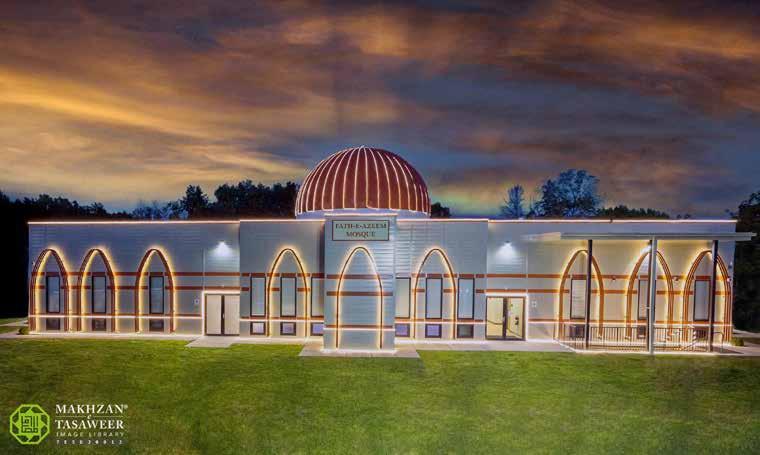
Hadith-e-Rasul – Sayings of the Holy Prophet Muhammadsa
Importance
Zion, Illinois, USA, 1 October 2022: Hazrat Mirza Masroor Ahmadaa, Khalifatul Masih V delivered the keynote address at the official inaugural reception of the Fathe-Azeem mosque in the historic city of Zion, USA. Dignitaries, friends, locals and neighbours were present for the reception.
After Hazrat Khalifatul Masih Vaa arrived for the inaugural reception, Hafiz Mubarik Kukoyi Sahib recited a portion from the
Holy Quran – Surah as-Saff, Chapter 61, Verses 7-10; the translation was given by Nasrullah Ahmad Sahib. Thereafter, an introduction to the Ahmadiyya Muslim Community was given by Amjad Mahmood Sahib.
The various dignitaries then spoke and presented their sentiments. The Mayor of Zion, Hon Billy McKinney, said how honoured he was by Huzoor’s arrival and
he prayed and wished the new Fath-eAzeem mosque would be a means of building bridges between all religions in Zion and was hopeful of this as Ahmadi Muslims brought the message, “Love for all, hatred for none” to the city. Mayor McKinney praised Islamic teachings towards other religions, including Christians.
Mayor Mckinney then presented the key to
Anas bin Malik, may Allah be pleased with him, narrated that the Holy Prophet Muhammad, peace and blessings of Allah be upon him, said:
is the duty of every Muslim to seek knowledge.”
Ibn Majah, Kitab al-Muqaddimah, Hadith
Hazrat Mirza Ghulam Ahmadas, In His Own Words Prayer and service of the Faith
The Promised Messiahas said: “The sort of person who attracts my attention, and for whom I feel an inclination to pray is only of one sort. When I come to know that a certain person is engaged in serving the Faith, and their person is beneficial to God, the Messenger of God, the Book of God and the servants of God, the pain and anguish that such a person feels is actually my own.”
The Promised Messiahas said: “Our friends ought to make a firm resolve in their hearts that they will serve the Faith. A person ought to serve in whichever manner or way that is possible for them.”
Then, the Promised Messiahas said: “I truthfully say that valuable and worthy in the sight of God is the one who is a servant of the Faith and beneficial to mankind. Otherwise, God does not care if such people die like dogs and sheep.”
(Hazrat Mirza Ghulam Ahmadas, Malfuzat
Ahmadiyya Archive & Research Centre (ARC), 22 Deer Park Road, London, SW19 3TL, UK info@alhakam.org | ISSN 2754-7396 Produce at least one or two ‘Abdus Salams’ within the next few years: Ahmadi scientists meet Hazrat Mirza Masroor Ahmad Page 7 Page 13 Page 5 THE WEEKLY www.alhakam.orgA AL HAKAM | Friday 7 October 2022 | Issue CCXXXVIII Establish the great victory of Islam across the world: Huzoor delivers Friday Sermon from Zion, USA Ode to Triumph Supreme (Alexander Dowie from his grave)
of seeking knowledge
Hazrat
“It
(Sunan
224) لوسر لاق لاق ،كلام نب سنأ نع ملسو هيلع هللا ىلص هللا ملسم لك ىلع ةضيرف ملعلا بلط
, Vol. 2, p. 42) A beloved remembered Part IV Page 14 Continued on next page >>
the city of Zion to Hazrat Khalifatul Masih Vaa
Hon Joice Mason, a member the Illinois General Assembly, was next to speak. She said the arrival of Huzooraa to inaugurate the mosque was a special moment “for the whole city of Zion” and highlighted how the vision of Alexander Dowie, to keep Zion as a theocratic state closed to those who did not follow him, was something that thankfully failed and now Zion celebrated representation from all kinds of faiths. She praised the efforts of Hazrat Khalifatul Masih Vaa toward world peace and women’s rights and prayed the mosque would continue to spread peaceful coexistence. Hon Raja Krishnamoorthi, a member of the United States Congress, spoke next. He commended the event’s organisers for preparing for Huzoor’s arrival and the dignitaries who travelled to be part of the reception. Hon Krishnamoorthi spoke highly of Hazrat Khalifatul Masih Vaa and the Ahmadiyya Muslim Community in the USA, who “lived out and embodied” the values Hazrat Amirul Momineenaa preached to them.
Dr Katrina Lantos Swett, President of the Lantos Foundation for Human Rights and Justice, then addressed the reception. She commended Ahmadi Muslims for practising what they preached. Dr Swett described the prayer-duel between Hazrat Mirza Ghulam Ahmadas and Alexander Dowie. Though the victory went to Ahmadis, Dr Swett highlighted that the victory of the pray-duel was for “humanity” as well, because it was a victory of respect, tolerance and peace that Hazrat Ahmadas embodied.
Dr Swett quoted Prophet Joseph, who ultimately said to his brothers who had abandoned him, “You meant it for evil, but God meant it for good” – she used this quote as a metaphor for the prayer-duel between Dowie and Hazrat Mirza Ghulam Ahmadas; Alexander Dowie meant it for evil, and Hazrat Ahmadas for good.
National Amir, Jamaat-e-Ahmadiyya USA, Mirza Maghfoor Ahmad Sahib then invited Hazrat Khalifatul Masih Vaa to address the audience.
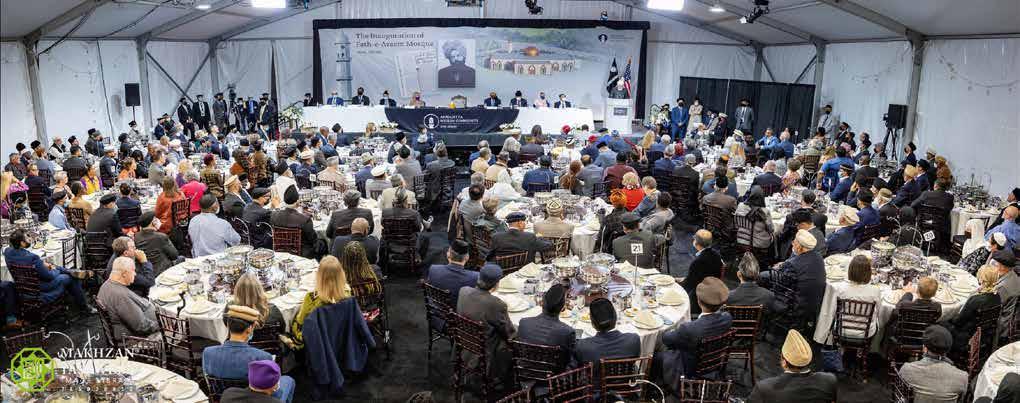
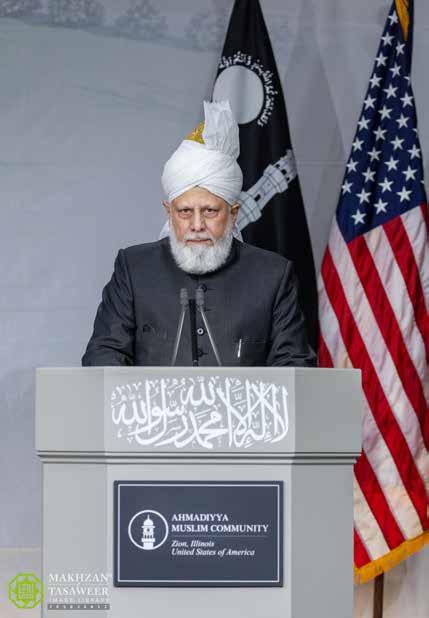
Hazrat Khalifatul Masih Vaa conveyed his salaam to all the guests and thanked them for joining the Jamaat for the evening.
“Rather than being a worldly event, this is purely a religious function hosted by an Islamic community and so your participation is a testament to your open hearts, tolerance and open-mindedness”, Huzooraa said.
Huzooraa said it was a matter of great happiness and significance for the Ahmadiyya Community to inaugurate the mosque.
Huzooraa said:
“In terms of Islam, we believe that having a mosque affords two overarching benefits.
Firstly, it enables Muslims to join together to worship God Almighty and to fulfil their religious duties and obligations to their faith. Islam instructs Muslims to worship five times daily. In addition, the second great benefit of building a mosque is that it serves to introduce Islam and its teachings to the wider community.
“If those who worship in the mosque earnestly strive to reflect and represent Islam’s teachings, it will naturally stir curiosity and interest in Islam amongst the local people. Their knowledge and understanding of Islam will increase and
any fears or concerns they harbour will, God-willing, dissipate upon seeing Muslims living peacefully amongst them and contributing positively to society.”
It was to fulfil these objectives that the Jamaat built mosques worldwide. Huzooraa said some may wonder what distinguished Ahmadi Muslims from other Muslims. It was destined, according to a prophecy of Prophet Muhammadsa that the true essence of Islam would be lost and Muslims would go astray. At the same time, Allah and the Prophetsa gave the glad tiding that “at a time of such spiritual decay, God Almighty would send a Promised Reformer to revive and rejuvenate the original teachings of Islam and he would bear the title of ‘The Messiah of Muhammadsa’. That Messiah would proclaim that Islam’s teachings were of peace, love and harmony. He would urge all people to live together peacefully and to forge ties of ‘‘mutual love and affection”, no matter their religious beliefs.
Hazrat Amirul Momineenaa said Ahmadi Muslims firmly believed that Messiah was Hazrat Mirza Ghulam Ahmadas who conveyed the message of Islam in its pristine condition. “Indeed, the Promised Messiah proclaimed that he would convey the teachings of Islam whilst walking upon spiritual footsteps of the Messiah of Moses, the Prophet Jesus, peace be upon him. Thus, like Prophet Jesus, the Promised Messiahas exhibited sympathy and compassion for mankind. His every word and deed was for the sake of peace and to cultivate the spirit of reconciliation in society.
“He reminded his followers that the very meaning of Islam was peace and security.”
Huzooraa said the Holy Quran proved the early wars in Islam were entirely defensive in nature and never once in the blessed era of Prophet Muhammadsa or his Rightly Guided Khulafa were wars fought out of injustice.
“In the modern era, whilst geopolitical conflicts continued to wreak havoc and destruction in the world, the Promised Messiahas said that religious wars had ended. Hence, there was no justification for Muslims or the people of any faith to fight in the name of religion.
“Thus, let it be crystal clear that the objective of the Ahmadiyya Muslim Community is not to conquer lands, seize territories,
Friday 7 October 2022 | AL HAKAM2
<< Continued from previous page
overcome cities or vanquish nations. Nor, in those lands where our teachings and beliefs have been accepted in large numbers, have we asserted a desire to gain political power or worldly influence.
“Our only mission and sole aspiration is to win the hearts of mankind through love and to bring people closer to God Almighty […] The Promised Messiahas wrote in a couplet: “What can I have to do with any country, “For my country is distinct from all others, “What can I have to do with any crown, “For my crown lies solely in the pleasure of my Beloved.”
Huzooraa said this couplet showed how the Ahmadiyya Muslim Community never desired worldly power or pomp as the Promised Messiahas showed in the couplet.
Hazrat Khalifatul Masihaa said the Ahmadiyya Community would never resort to violence or oppression and its history proved this. This was based entirely on the original teachings of the Holy Quran. Huzooraa alluded to King Charles’ respect for Islam and his desire to be the defender of ‘‘all faiths’’ and not just one faith (Christianity) – this desire of the King was commendable, Huzooraa said. Huzooraa also commended the United States government, which had now established the office of international religious freedom and also held a global summit for universal religious freedom.
Hazrat Khalifatul Masih Vaa quoted the Holy Quran – Surah al-Hajj, chapter 22, verse 41 – where Allah spoke of those who were persecuted due to their religion: “Those who have been driven out from their homes unjustly only because they said, ‘Our Lord is Allah’ — And if Allah did not repel some men by means of others, there would surely have been pulled down cloisters and churches and synagogues and mosques, wherein the name of Allah is oft commemorated. And Allah will surely help one who helps Him. Allah is indeed Powerful, Mighty —”
Huzooraa said:
“Thus, the Holy Quran is the only divine scripture that not only grants absolute religious freedom to the people of all religions and beliefs but goes further by instructing Muslims and those who enter mosques, to protect the religious rights of non-Muslims.
“It is that heavenly scripture which is the protector and defender of all religions, faiths and beliefs. It is these pure and allembracing Islamic teachings that we strive to propagate to all parts of the world.
The Prayer Duel between Hazrat Ahmadas and Dowie
Huzooraa spoke about the prayer-duel between the anti-Muslim Christian evangelist, Alexander Dowie and Hazrat Mirza Ghulam Ahmadas. Huzooraa said some may question the firm language Hazrat Ahmadas used towards Dowie and how this stayed with his claim of preaching love and compassion. However, it ought to be kept in mind that there was “absolutely no contradiction between the peaceful teachings of the Promised Messiahas and his response to Mr Dowie”
The Promised Messiahas never called for any sort of violence or extreme reaction and approached Dowie’s harshness with great wisdom so that further discord would not spread. On seeing Dowie’s hostility:
“The Promised Messiahas sought to reason with him respectfully and to persuade him to show restraint and to respect the sentiments of Muslims. Conversely, it was Mr Dowie who sought confrontation with Islam and was explicit in this desire. For example, Mr Dowie wrote, ‘I pray to God that Islam should soon disappear from the face of the earth, O God accept my prayer, O God destroy Islam.’ Furthermore, in his writing, Mr Dowie spoke with relish at the prospect of what he described as a ‘great war’ between Christianity and Islam.”
Mr Dowie wrote that if Muslims did not embrace Christianity they would face
death and destruction. In response to such extreme rhetoric, The Founder of the Ahmadiyya Muslim Community, in the face of this hatred, desired that millions of innocent people were not harmed and wanted to diffuse the situation– “which would have been the case if Mr Dowie’s desire for religious wars between Christians and Muslims was realised”. Therefore, the Promised Messiahas – to diffuse the situation – challenged him to a prayer duel.
“He said that rather than calling for the death or destruction of all Muslims, he and Mr Dowie should both engage in solemn prayers and pray to God that whichever of them was a liar, should die during the life of the other party.
“This was actually an act of compassion and a means to diffuse the situation. Rather than risk an all-out confrontation between Muslims and Christians, the Promised Messiahas asserted that he and Mr Dowie should resort to prayer and leave the matter in the hands of God Almighty.
“It was a fair and peaceful means to determine the truth. It is no exaggeration to state that it was a magnificent example of restraint in the face of immense provocation and hostility.”
“Upon receiving the challenge, Mr Dowie responded by describing the Promised Messiahas in the most offensive of terms. It is recorded Mr Dowie said, ‘In India, there is a Muhamaddan Messiah who keeps on writing to me. Do you think that I should answer such gnats and flies? If I were to put my foot on them, I would crush them to death.’”
The Promised Messiah’s challenge spread far and wide in the press and journalists compared the two: Mr Dowie was extremely wealthy and famous, while also enjoying better health and younger age than the Promised Messiahas. Yet despite these material odds he faced, the Promised Messiahas never stepped back and continued the challenge.
Ultimately, Dowie perished; he lost his supporters, wealth and physical and mental faculties. “He ultimately suffered what the US media described as a ‘pathetic end’. “Indeed the US media of the time deserves credit because their journalists reported honestly on the outcome. For example, a famous Boston Herald headline declared that “Great is Mirza Ghulam Ahmad the Messiah.”
“In short, the Founder of the Ahmadiyya Muslim Community never sought to exert his views or values upon anyone forcefully […]
“For Ahmadi Muslims, this incident serves as a sign of the truth of our Founder and so, in this respect, the city of Zion holds a significant place in our history.”
Huzooraa said there was an exhibition at the mosque for people to learn more about this historic victory.
Hazrat Khalifatul Masih Vaa said: “It is the paramount objective of the Ahmadiyya Muslims Community to direct mankind to the path of spiritual salvation and to ensure that all people, irrespective of their cast, creed and colour, live together with the spirit of goodwill and harmony and in true peace and security.
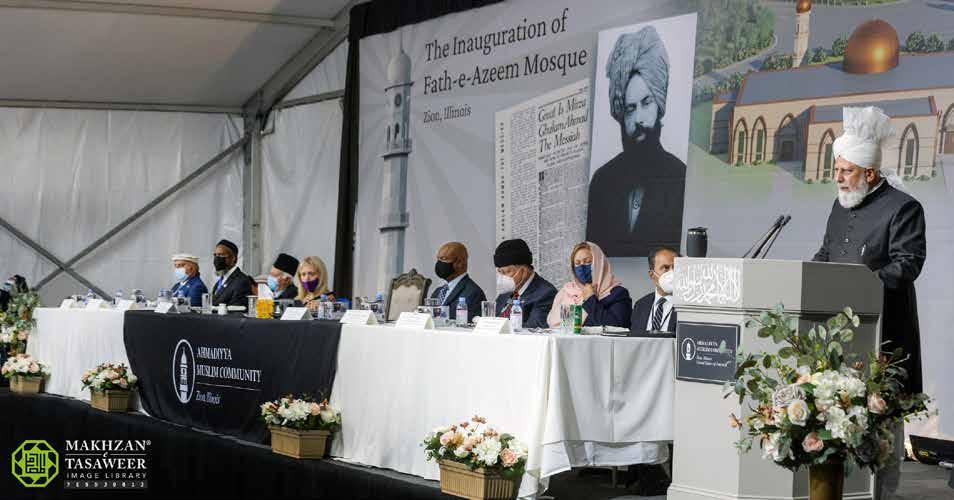
“From the depth of my heart, I pray that this mosque will, God-willing, always serve as a beacon of peace, tolerance and love for all mankind. I pray it proves to be a place where people congregate in all humility, to recognise their Creator, to bow before Him and to fulfil the rights of mankind, for we earnestly believe that we can only be successful and prosperous if we fulfil the rights of worship of God Almighty and the rights of humanity.”
Huzooraa thanked all the dignitaries, especially the Mayor of Zion, for giving him the keys of Zion and said that he was sure “the key of this town is now in safe hands”.
Hazrat Amirul Momineenaa led everyone in silent prayer and the reception came to a successful conclusion.
3AL HAKAM | Friday 7 October 2022
Hazrat Khalifatul Masih Vaa delivering the keynote address at the inauguration reception of Fath-e-Azeem Mosque
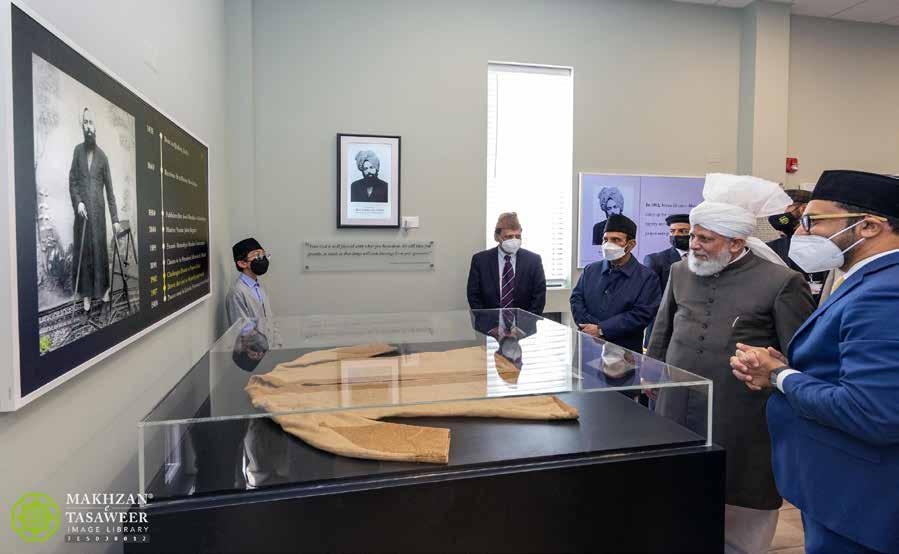
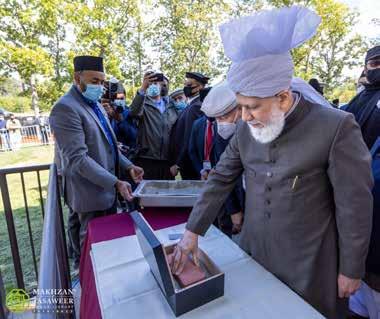
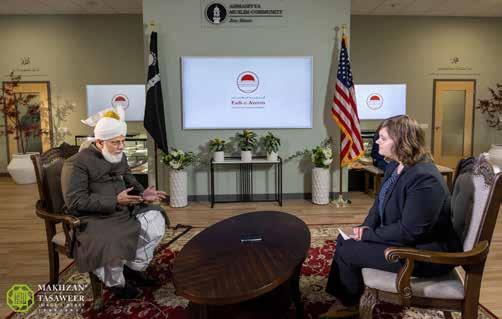
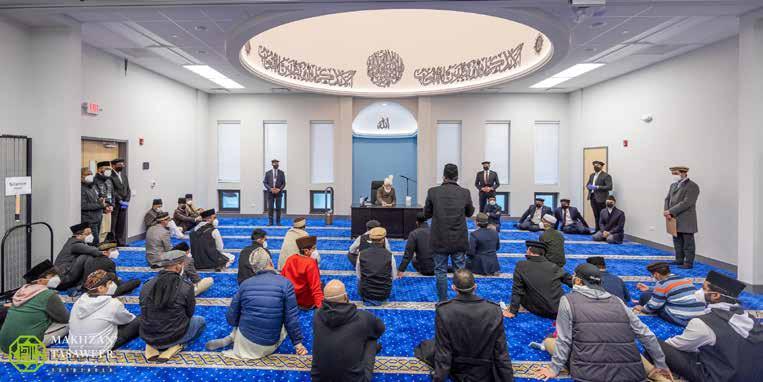
Friday 7 October 2022 | AL HAKAM4 1 2 3 4 1- Hazrat Khalifatul Masih Vaa inspect ing the exhibition at Fath-e-Azeem Mosque Zion, IL, USA 2- Religion News Ser vice (RNS) interview ing Hazrat Khalifatul Masih Vaa 3- Hazrat Khalifatul Masih Vaa laying the foundation stone for a minaret to be built as part of Fath-e-Azeem Mosque Zion, IL, USA 4- Hazrat Khalifatul Masih Vaa grants an audience to members of the Jamaat in Zion
Establish the great victory of Islam across the world: Huzoor delivers Friday Sermon from Zion, USA
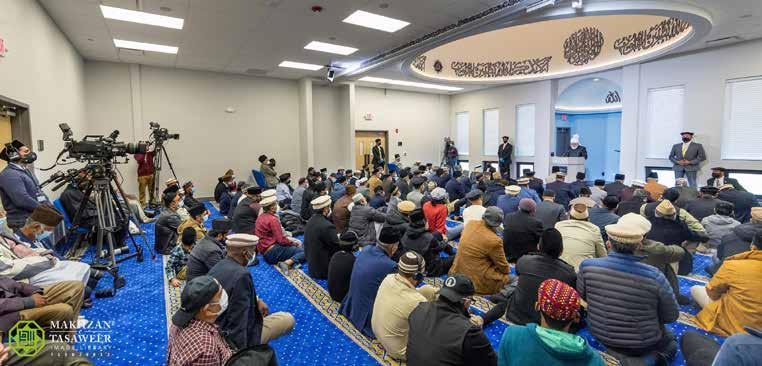
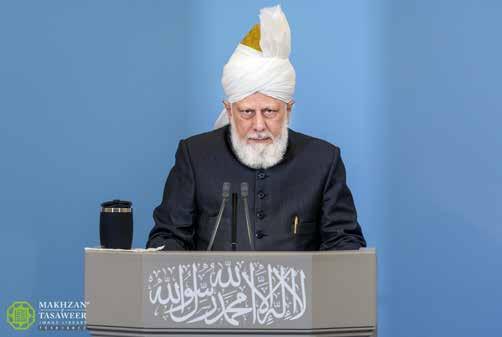
On 30 September, at around 1 pm CDT, Hazrat Khalifatul Masih Vaa delivered his Friday Sermon from the newlyinaugurated Fath-e-Azeem Mosque in Zion, Illinois, USA, which was broadcast live by MTA International.
Hazrat Amirul Momineenaa started the sermon by narrating how a journalist had asked him about the significance of constructing a mosque in this particular part of the world. Huzooraa said he explained to her that the Ahmadiyya Muslim Community built mosques across the globe. They were all important to us. However, a unique significance of this mosque was that this city of Zion was built by a staunch opponent of Islam. Huzooraa said that those interested in history could learn more about it through an exhibition that Jamaat had set up at the mosque.
Huzooraa continued that the fulfilment of the Promised Messiah’sas prophecy regarding Dowie filled the hearts of every Ahmadi with gratitude and so it should. With regards to the construction of the mosque, Huzooraa said, we were also grateful to the current citizens of Zion, who had supported the mosque’s construction, despite some initial resistance from the city’s council. Above all, Huzooraa said, Ahmadis ought to be grateful to that Great Lord, Who gave us the opportunity to build this mosque. Hence, it was not only a day of great joy for Ahmadis but also a day of immense gratitude to Allah, Who had enabled us to not only build a mosque but also to “witness a living sign of the truthfulness of the Imamas of the Age who was the most ardent devotee of the Holy Prophetsa.”
Referring to the fulfilment of the prophecy regarding John Alexander Dowie, Huzooraa said, we would continue to witness the fulfilment of God’s promises as long as we continued to be grateful to Him and followed His commandments. Huzooraa said, if this was not a manifestation of the fulfilment of God’s promises, then what was it that today we were building a mosque in the city of that false claimant and opponent of Islam, regarding whose death the Promised Messiahas had made a prophecy after being informed by Allah the Exalted.
Huzooraa then asked, however, “Does our work end here? Is this sufficient for us that we have built a mosque in this small town of Zion and that the progress of the Ahmadiyya Muslim Community has been realised?,” before saying, no, Allah had made the entire world a ground for us to make further efforts and achieve success in every village, town and city of the world.
Huzooraa then drew the attention of Ahmadis toward elevating the standards of worship, noble conduct and giving precedence to faith over all worldly matters.
He said, it was the duty of every one of us to become those who offered their prayers assiduously. We had to inculcate the same in our children too. Consequently, we would see the promises made by Allah to the Promised Messiahas fulfilled for us sooner. However, if we did not pay attention to these matters. We would be causing a delay in their fulfilment.
Huzooraa said, even though the Holy Prophetsa had been guaranteed victory at the Battle of Badr, he prayed and begged Allah for success with utmost humility, after which he was granted the greatest victory of all times. The Promised Messiahas said that that triumph was made possible by the humble prayers of the Holy Prophet Muhammadsa Huzooraa said that, the mosque had been named Masjid Fath-e-Azeem (Mosque of the Great Victory) based on the revelation and
prophecy of the Promised Messiahas. It referred to the victory Allah granted to the Promised Messiahas over John Alexander Dowie. “Today, is the next step [of that fulfilment], as we inaugurate this mosque in his city. We saw one aspect of the revelation of the Promised Messiahas being fulfilled 115 years ago, and we are witnessing its next step today,” Huzooraa said.
Huzooraa then briefly narrated some of the history and the saga of John Alexander Dowie, how he incurred the wrath of Allah and how Allah fulfilled the prophecy and His promises to the Promised Messiahas, with reference to a report published in The Sunday Herald, Boston, which had run the headline “Great is Mirza Ghulam Ahmad The Messiah. Foretold Pathetic End of Dowie, and now He Predicts Plague, Floods and Earthquakes”.
Huzooraa then said that, certainly, it was a great victory which provided proof for the truthfulness of the Promised Messiahas, but, just as the Companions of the Holy Prophetsa did not rest after achieving the greatest victory that was the Victory of Mecca, we too must not rest. Rather, it was our duty to continue to win the hearts of people, to perform tabligh and to peacefully spread the message of Islam and the Holy Prophetsa to the entire world. With efforts and continuous prayers, that great victory would become permanent.
Alongside this, Huzooraa said, the opposition of God’s communities also continued and when some of weak faith departed, Allah granted thousands more. If we truly believed in the Promised Messiahas, we had to become his helpers with all our faculties and establish the examples of the Companionsra. We had to gather the Muslims upon the one true faith and eradicate bad practices from them and enlighten the non-Muslims with the beautiful teaching of Islam and also bring them under the banner of the Holy Prophet Muhammadsa
Huzooraa then shed light on the purpose of life in light of the Holy Quran and the writings of the Promised Messiahas Huzooraa said, the inauguration of this mosque would become “great” for us only, if we understood the purpose of our creation and elevated the standards of our worship.
Huzooraa said, the Promised Messiahas did not merely issue a challenge for the death of an individual, rather its purpose was the establishment of the grandeur of Islam, and the rule of the One God and His Messengersa. It was our duty today to do the same in this era. However, for it to happen, there had to take place a major spiritual revolution within each of us and within our progenies.
5AL HAKAM | Friday 7 October 2022
His Holiness’ message is not about land or politics – it is about love: Guests reflect on Hazrat Mirza Masroor Ahmad’s inaugural address at Fath-e-Azeem mosque in Zion, USA
Faran Rabbani USA Correspondent
In the morning of 30 September 2022, despite the chilly weather, scores of Ahmadis started to queue to get a space inside the new Fath-e-Azeem mosque in Zion, USA, for Jumuah prayers that were to be led several hours later by Hazrat Khalifatul Masih Vaa
This was the first time in the history of Zion, Illinois, that a Khalifa of the Promised Messiahas was leading the Friday sermon from this land while it was also being broadcast live to the global audience on MTA International.
With the delivery of the Friday Sermon, Huzooraa officially inaugurated the Fath-eAzeem mosque. There were more than 2600 people in attendance who travelled far and wide to be part of this historic event. These members not only travelled from distant places across the United States but also from other countries, including Pakistan, the UK, the Philippines, Brazil, Germany, Bangladesh, India, Mexico, Canada, Guyana and Sweden among others.
Saturday was going to be another important day in the history of Jamaat-eAhmadiyya as it was the official inaugural reception of the Fath-e-Azeem mosque. Hundreds of volunteers were working tirelessly on the inaugural dinner. The external guests – which included dignitaries, members of parliament, public servants, locals and friends – started to arrive by 4 pm and were shown their respective tables. Since the new exhibition about the prayerduel between the Promised Messiahas and Alexander Dowie was open to the guests, some of the guests chose to view the exhibition prior to the inaugural dinner event.
Prior to the event, some of the visiting dignitaries had the honour of having an audience with Hazrat Khalifatul Masih Vaa –they included the following:
1. Billy McKinney, Mayor of Zion, Illinois
2. Joyce Mason, State Congresswoman, 61st District, Illinois
3. Raja Krishnamoorthi, US Congressman, Illinois, 8th District
4. Dr Katrina Lantos Swett J.D., PhD, President of the Lantos Foundation for Human Rights & Justice
5. Chelsea Hedquist, Lantos Foundation for
Human Rights & Justice
6. Dr Craig Considine, PhD, Senior Lecturer, Rice University Department of Sociology
7. Sheriff John Idleburg, Police and Fire Commissioner, Lake County, Illinois
8. Cheri Neal, Supervisor of Zion Township and coach for Public Servants Zion, Illinois
9. Mary Lou Hiltibran, Emergency Services and Disaster Agency (ESDA), Zion, Illinois
10. Eric Reinhart, State Attorney, Lake County, Illinois
11. Rabbi Melinda Zalma, Manager of Programmes, Tanenbaum Center for Interreligious Understanding, New York
12. Rabbi Marc Belgrad, founder of B’Chavana Congregation in nearby Buffalo Grove, Illinois
13. Adriane Johnson, State Senator, 30th District, Illinois
14. Dr Gabrielle Lyon, Executive Director, Illinois Humanities
15. Yadira Sanchez Olson, Reporter, Lake County News-Sun which is owned by the Chicago Tribune
Some of the other dignitaries that attended the event were Mark Senak, Mayor of Glen Ellyn Illinois; Mike Formento, former Mayor of Glen Ellyn, Illinois; Zion Commissioner Chris Fischer; Zion Commissioner Jacqueline Holmes; Lake County Board Member Gina Roberts; Library Director Robin Smith; Zion Benton High School Superintendent Dr Jesse Rodriguez; Zion High School Principal Zackary Livingston; Sara Knizhnik Vernon Township Trustee and Chair of the Gun Violence Prevention Initiative (GVPI) at the Lake County State’s Attorney’s Office; Zion Park District Director for Hermon Park David Osborne; Zion City Assessor Collette Davis; Lake County Public Works Commissioner Amos Monk; Mary Eldy Allen was State Senator of IL 51st district now running for 31st District; Mark Curran was Lake County Sheriff now running for Illinois Supreme Court; and Zion Police Chief Eric Barden.
The media coverage of the event
The following media outlets covered Hazrat Khalifatul Masih’s visit to Zion:
Associated Press (AP) — Two Prophets, century-old prayer duel inspire Zion Mosque. AP have a readership of around half the world, according to their website; the article was syndicated across over 150 separate outlets, including the Washington
Post, ABC News, Toronto Star, The Hill and many other prominent newspapers. It was a top-10 story for the Associated Press Religion News Service (RNS) Ahmadi Muslims inaugurate new mosque on site of historic ‘prayer duel’. RNS have a reach of 2.2 million people per month.
Lake County News-Sun (which may also be syndicated in the Chicago SunTimes or Chicago Tribune) will run an article this week.
In total, nearly 18 million people were reached across 408 outlets in 13 countries. “I did not know that before tonight and I think it is beautiful.” – Guest impressions Billy McKinney, Mayor of the City of Zion (who presented Huzooraa with the key to the city) said:
“My family has lived here since 1962. This was a historic event, as you well know, for the Ahmadiyya Muslim Community and for the City of Zion.
“It was overwhelming for me to meet His Holiness tonight. And this is the first time in my life that I’ve met someone [and] that I was speechless and didn’t know what to say. But he has such a great presence, and the Ahmadiyya Muslim Community has done so much to help in this community and be of service. And we look forward to continuing with the relationship and working and having the mosque here now right in the midst of the city is terrific.”
Tracy Johnson, a local resident of Zion, said the following about Huzoor’s address:
“I like the way His Holiness made his speech; the contrast between the right and the wrong. I mean, he hit everything on the point and I liked the way he spoke in a gentle tone.”
Kelvin Cox, a local architect who worked on the Fath-e-Azeem mosque’s drawings, design and construction documents, said:
“This is an amazing building; the lighting and all the different people that put the ideas together. I’m just flabbergasted by how beautiful it is. And to have His Holiness here, his message of God and that it’s not about land, it’s not about politics, but it’s about, you know, doing the right thing in love and the [avoiding] of hatred. And it was just a wonderful [event]. That’s what the world needs today.”
John D Eidelburg, Sheriff of Lake County, said:
“It was a pleasure to be here to see the Imam and listen to all these great leaders
and also to have a word with the leader. It was very impressive. I’m very honoured to be here. I want to thank you for giving me the opportunity to share this precious moment with your community.
“People have told me about how impressive he is as a speaker. I was just so overwhelmed by the words that he said about friendship and working together with your community. That made me proud to be in his presence, to hear him speak. It was very illuminating.”
Congressman Raja Krishnamoorthi said:
“What a wonderful day. What a wonderful event. His Holiness visited us and graced us with his presence. And the Fathe-Azeem mosque will be a wonderful place for people to congregate, worship, share fellowship, and, of course, and educate the wider community about Islam.”
Cheri Neal, Zion Township Supervisor said:
“I’m just in absolute awe! I’m really, really excited about this momentous occasion for the Ahmadiyya Muslim Community. And they have been working towards it for so long.”
Dr Craig Constantine from Rice University expressed amazement about the mubahilah – prayer-duel – saying more people needed to know about this. He also expressed how much peace and calm he felt being in Huzoor’s presence. He said everyone should hear Huzoor’s message. He also loved Huzoor’s humour at the end of the keynote address.
Amos Monk, the former Zion Commissioner, said:
“Well, this doctrine, I think, is very, very dynamic. And I feel that it should be something that the world at large should be more aware of […] I think this is the bestkept secret in the world at this point in time, because I’m looking at this [showing the brochure that was on all the tables] energy, equity, justice, fairness and love for all. That is what’s needed throughout the universe; no hatred and we could be a dynamic world […] I think this message should be heard by the world […] and that is the only way we can cure the ills of the world.”
Rabbi Melinda Zalma, Tanenbaum Center for Inter-religious Understanding in New York City, said:
“Very impressed, as I always am, with the Ahmadiyya Muslim Community. Just
Friday 7 October 2022 | AL HAKAM6
the openness and welcoming the message of your leader and just the spirit of really living your values, being open to all, working towards peace and respecting each other as individuals and as humans.”
Eric Bricbarden, Chief of Police in Zion, said:
“It was a wonderful event, and it was very nice to see the love and the acceptance from all the people here and the generosity that was displayed, the intentional and deliberate welcoming. It doesn’t matter who you are, ‘just want to make sure everybody’s doing OK’ kind of a message. It was very nice, very nice. Just an amazing event.”
Jennifer Smith said:
“Speaking about the tenets of the community, I think that that is absolutely paramount. When you drive down Zion on the old building, you see that motto on the building, and so it reverberates with you. So, you really get a chance to let that sink in and it really embodies the spirit of what Zion is.”
Zach Livingston, principal at the local high school said:
“Zion is a small community, and events like this, any excuse to bring the community together is a good one, regardless of what it is. So, the fact that we had the opportunity to have this mosque dedication here in our community, people from all over the world, but also in Zion, are here. It’s awesome and it’s an honour. […] Having His Holiness here, our Mayor of Zion, McKinney, was here. It was an amazing event.”
Shawna Reagan of Chicago visited the Fath-e-Azeem mosque for the first time. She said:
“Honestly, coming here tonight, this was all very new to me. I did not really know anything about the community. I was really very impressed to hear His Holiness speak and to hear his thoughts on supporting the freedom of each person to choose their own way.
“The purpose of mosques in Islam is not just to worship God but also, it’s a source of introducing people to the religion of Islam as well as creating bridges between communities. I did not know that before tonight and I think it’s beautiful. If we had more of that, I think the world would be a much better place.”
Kirk Townder from Libertyville said:
“It’s a beautiful setting and wow, what a wonderful presence to be here in Zion.”
Mr Kirk’s wife added:
“I feel so honoured to be here tonight and I love the saying ‘Love for all. Hatred for none.’ I’m actually going to put this in my office so I can look at it and remember this night.”
A group of guests from Chicago noted the incredible organisation of the event and the manners of the Ahmadi volunteers. They also mentioned how every time they come to our events, the message of love and peace is so central to everything. They took a picture with Huzooraa and said it was “an opportunity of a lifetime.”
The arrival of Hazrat Khalifatul Masih Vaa in Zion, his inauguration of the mosque and his address were a blessing for Jamaat-eAhmadiyya USA in particular and a striking reminder of the great victory Allah granted to the Promised Messiahas
Produce at least one or two ‘Abdus Salams’ within the next few years: Ahmadi scientists meet Hazrat Mirza Masroor Ahmad
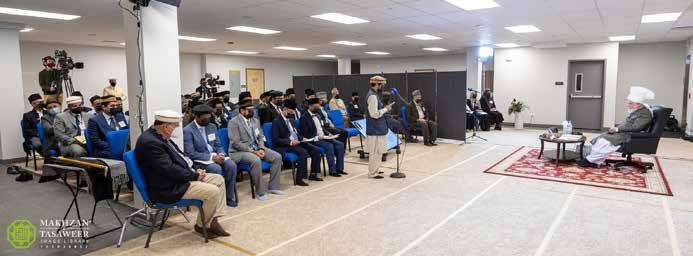
Faran Rabbani USA Correspondent
On 29 September 2022, the Association of Ahmadi Muslim Scientists USA (AAMSUSA) and the Ahmadi Women Scientists Association (AWSA) were blessed to meet with Hazrat Khalifatul Masih Vaa and share their research while also getting valuable guidance and direction from their Imam.
The meeting began with a recitation from the Holy Quran, followed by a brief introduction and report from the president of AAMS-USA Dr Sohail Husain Sahib and then by Dr Nusrat Sharif Sahiba, the AWSA president.
After the brief report on the association’s efforts, its history and its mission to “lead the next Islamic Golden Age”, Huzooraa inquired about the number of PhDs each association had and what impact their research was having.
Huzooraa also asked about their collective target of “achieving 100 Abdus Salams” and the efforts made towards making this a reality. Hazrat Amirul Momineenaa reminded the association that in 2019 during the Ahmadiyya Muslim Research Association (AMRA) conference in the UK, he had reminded Ahmadi Muslim researchers that Hazrat Khalifatul Masih IIIrh had expressed his ardent desire for at least 100 Ahmadi Muslims to follow in the footsteps of Dr Abdus Salam and become eminent scientists by the turn of the first centenary of the Jamaat. Huzooraa said 33 years had passed yet we had not produced the next Abdus Salam.
Hazrat Khalifatul Masih Vaa asked the AAMS and the AWSA presidents about their plans to achieve this goal, to which Dr Nusrat Sahiba replied that “based on our current membership data we have 10 promising candidates and in the next year we may have another ten and by three years, 50% of these Ahmadi Scientists will reach the highest echelons of science, God willing.”
Hazrat Khalifatul Masih Vaa commented, “I hope within the next few years you will
have at least one or two [Abdus Salams]”, God willing.
Some members of the associations were able to present a synopsis of their research work in different scientific fields.
Dr Sohail Husain, President of the AAMS, mentioned afterwards that he felt that with Huzoor’s visit, “the heavens have opened up for us. Collectively, we (the Muslim Ummah) have waited 1300 years for this moment. Our Khalifa has come to the centre of worldly knowledge which is the United States and told us that we can excel all others because of our faith”.
Dr Asif Jamil, a faculty instructor at Harvard Medical School in Boston, presented some of his research in the field of neuroscience – specifically brain stimulation techniques and protocols to treat different diseases pertaining to the fields of psychiatry and psychology. Reflecting on the meeting, Dr Asif Jamil said:
“Huzooraa provided me with great feedback and he asked me what I and other Ahmadi scientists were doing in order to bring our research to the masses. If our research had already been taken to the level of application […] This is not only a good question but has also given me a future direction for my research, namely that I should not just think about the lab research but think about how you can develop this technique in a way that it leads to the development of a treatment that can actually make a difference in the world”.
Another participant was Ms Olivia Barber, a PhD candidate from Northwestern University who studies the effect of spraying disinfectants on the creation of bacteria that become resistant to antibiotics over time.
Ms Olivia told Al Hakam afterwards that she mentioned to Huzooraa her interest in studying this to find out what the exact changes were in bacteria that caused resistance and about finding a solution to the problem. Huzooraa asked if she had found anything thus far in her research, to which she replied, “at the moment I have not”. She continued to tell us, “However, I felt this was an encouragement to keep searching.
I also noticed Huzooraa asking others about how they were planning to apply their work, which made me think it was important to keep in mind the translation of one’s scientific research into practical uses.”
Ms Olivia Barber felt blessed to be a part of this special gathering. She mentioned that “it felt like a turning point in my commitment to this path. I feel that Huzooraa has given us all the guidance and it is now time for us to work to implement his vision and that of the third Khalifarh with dedication and prayers.”
Ms Naila Razzak, another PhD Candidate in the field of Social Sciences at Yale University, had the opportunity to be part of this historic meeting. In her brief presentation before Huzooraa, she mentioned that her field was the Late Antiquity of the Middle East, focusing especially on early Jewish and Christian communities in the region. She also said she studies various texts and inscriptions in order to learn more about the origins, development and interaction of Semitic languages, including Hebrew, Syriac, Arabic and Ethiopic.
Ms Naila Razzak also shared her observations from the meeting with Al Hakam:
“Huzooraa was very encouraging to those striving to make a positive impact through their research, especially to young Ahmadi women when he asked about the ratio of men and women attaining PhDs, which was extremely motivating for me. As I presented to my beloved Huzooraa, he asked whether my field was social science and whether I was still working on finishing my PhD. I was humbled that Huzooraa was so encouraging, even to younger and aspiring scholars and researchers.
“I am humbled and energised by the experience and am now reinvigorated to work harder and strive for a high level of success and dedication to service in accordance with beloved Huzoor’s guidance. This mulaqat was historic for AWSA because of the mission of the association to create 100 award-winning, high-impact scientists and researchers.”
This historic meeting lasted for about 40 minutes.
7AL HAKAM | Friday 7 October 2022
Members of Association of Ahmadi Muslim Scientists USA sitting with Hazrat Khalifatul Masih Vaa
This Week in History
his fear that the world was moving towards another world war. He said his message to all nations was simply to “be sensible” and to seek peace.
On the same day, Huzooraa laid the foundation stone for the first Ahmadiyya mosque in the Dutch city of Almere. Huzooraa named the mosque, Baitul Aafiyat.
7 October 2016: Hazrat Khalifatul Masih Vaa held a press conference with representatives of the Canadian print, broadcast and ethnic media, including CTV and the Toronto Star. During the 35-minute press conference, Huzooraa was asked about his views on establishing peace in the world, the continued threat of terrorism and extremism and the purpose of his visit to Canada. Regarding the efforts of the Jamaat to curb extremism, Huzooraa said:
“We have no worldly power and so all we can do is to continue to peacefully preach Islam’s true teachings. It is a slow process, but one day we shall win the hearts of people and the brutalities witnessed in the world today will stop. We are very determined and so we will never give up our tasks.” (“‘One day we will win the hearts of people’ – Head of Ahmadiyya Muslim Community”, www.pressahmadiyya. com)
7 October

7 October 2005: An Ahmadi mosque in Mong Rasul, Mandi Bahauddin, Pakistan was attacked by the opponents while the members were offering the Fajr prayer. As a result, eight Ahmadis were martyred, and 20 were injured.
7 October 2011: During his Friday Sermon on this day, Hazrat Khalifatul Masih Vaa mentioned Master Rana Dilawar Hussain Sahib, who was martyred in Sheikhupura, Pakistan on 1 October.
7 October 2015: Hazrat Khalifatul Masih Vaa was interviewed by the
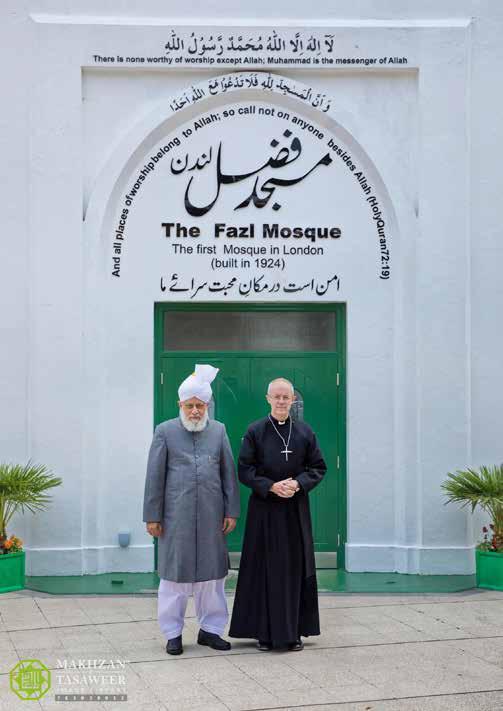
Dutch newspaper De Stentor at the Baitun Noor Mosque complex in Nunspeet, the Netherlands. During the interview, Huzooraa spoke of
8-9 October
8 October 2004: During his Friday Sermon on this day, from the Baitur Rahman Mosque in Scotland, Hazrat Khalifatul Masih Vaa advised members of the Jamaat to perform tabligh (preaching) with regularity, wisdom, and prayers. Huzooraa further said that the first sermon Hazrat Khalifatul Masih IVrh had delivered in the UK regarding his divine vision of ‘Friday the 10th’ was at this mosque, when he came for its inauguration.
Huzooraa said that Hazrat Khalifatul Masih IVrh had advised, “All Ahmadis should pledge that they would live and die according to the will of God and spread the message of Islam all over the world.” (“Friday the 10th: A glad tiding to the Jamaat”, alhakam. org)
9 October 2013: Hazrat Khalifatul Masih Vaa arrived in Melbourne after a short flight from Sydney. His visit marked a historic moment in the history of Ahmadiyyat as it was the first time ever that a Khalifa had visited Melbourne.
9 October 2015: Hazrat Khalifatul Masih Vaa was interviewed by the Dutch media outlet De Correspondent at the Baitun Noor Mosque complex in Nunspeet, the Netherlands.
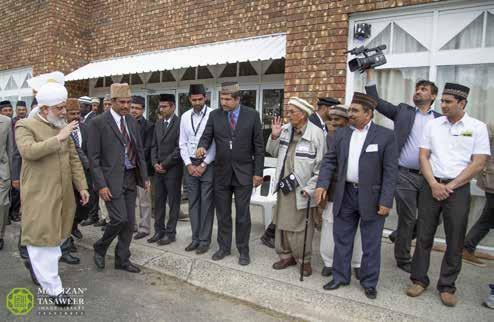
On the same day, Huzooraa delivered his Friday Sermon at the Baitun Noor Mosque in Nunspeet. He went on to speak about the importance of MTA International and said that members of the Jamaat should make particular efforts to watch the Friday Sermon of the Khalifa of the time. Huzooraa said that MTA was a means of uniting Ahmadi Muslims across the world and a means for the members to hear the message of their Imamaa
9 October 2016: Hazrat Khalifatul Masih Vaa delivered the concluding address at the 40th Jalsa Salana Canada, at the International Centre in Mississauga.
his Friday
Friday 7 October 2022 | AL HAKAM8
10 October 10 October 2003: During
The Archbishop of Canterbury meeting with Hazrat Khalifatul Masih Vaa
History
Sermon on this day, Hazrat Khalifatul Masih Vaa said that exactly 100 years ago, Hazrat Sahibzada Abdul Latifra was martyred in Afghanistan.
Huzooraa said:
“O Messiah of the Latter-Days, congratulation to you that your beautiful Jamaat has fulfilled the expectations which you had from them. […] They never hesitated to sacrifice their wealth, time, and lives, and we are witnessing such scenes in this era as well.”
10 October 2008: Hazrat Khalifatul Masih Vaa inaugurated the first purpose-built Ahmadiyya mosque in France, the Mubarak Mosque. During his Friday Sermon, Huzooraa said:
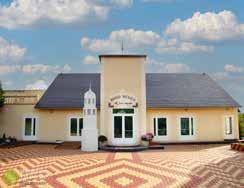
“On 28 December 1984 – during his tour to France – Hazrat Khalifatul Masih IVrh mentioned his vision for the first time, in which he saw the number ‘10’ shining on a clock. And the thought that came to his mind was that it was the date of Friday the 10th, instead of being related to time on a clock.
“So today also, coincidentally or by Allah the Almighty’s decree, it is Friday the 10th and the first [Ahmadi] mosque of France is being inaugurated. May God attach those blessings with this mosque as well, which were vouchsafed to Hazrat Khalifatul Masih IVrh – as Allah the Almighty fulfils matters in many aspects and many ways. May this mosque prove to be a milestone for the Jamaat’s progress in this country.” (“Friday the 10th: A glad tiding to the Jamaat”, alhakam.org)
10 October 2017: The Archbishop of Canterbury, Justin Welby, visited
the Fazl Mosque where he met with Hazrat Khalifatul Masih Vaa. Earlier, the Archbishop visited the Baitul Futuh Mosque in Morden as well.
Huzooraa presented the Archbishop with a copy of the Holy Quran, including both the original Arabic text and the English translation.
11 October
11 October 2013: Hazrat Khalifatul Masih Vaa delivered the keynote address at a special reception held at the Princess Court Reception Centre in Melbourne. The event was attended by more than 100 nonMuslim dignitaries and guests.
During his address, Huzooraa
analysed in detail the major threats to world peace, including the socalled ‘Arab Spring’ and spoke of his serious concern that the world was increasingly at the precipice of a horrific Third World War. Thereafter, His Holiness outlined the pathway to peace based on true Islamic teachings.

11 October 2015:
Hazrat Khalifatul Masih Vaa held an 80-minute meeting with a delegation of 22 Ahmadi converts, who had travelled from France to the Baitun Noor Mosque in Nunspeet, the Netherlands.
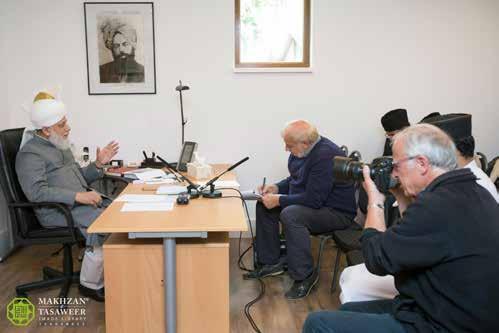
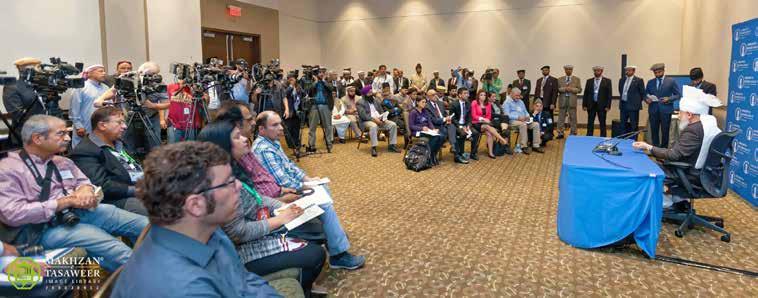
The delegation included local French converts and also those who originated from other countries such as Algeria, Mali, Mauritius and
Morocco. Following the conclusion of the meeting, a bai‘at ceremony took place as well.
11 October 2016: Hazrat Khalifatul Masih Vaa inaugurated the Baitul Afiyat Mosque in Scarborough, Canada. A special distinction of this mosque was that the vast majority of the cost was funded by Lajna Imaillah Canada.
12-13 October
12 October 2012: Canada’s Minister for Citizenship, Immigration and Multiculturalism, Jason Kenney MP, visited Hazrat Khalifatul Masih Vaa at the Fazl Mosque, London.
During the hour-long meeting, various issues were discussed, including Canada’s forthcoming ‘Office of Religious Freedom’ and efforts to tackle extremism. In terms of the role of the Ahmadiyya Muslim Community, the minister said that he had always found it to be an entirely peaceful and law-abiding community that contributed positively to Canadian society.
13 October 2006: During his Friday Sermon on this day, Hazrat Khalifatul Masih Vaa said that in various Muslimmajority countries the opponents were using disrespectful words for the Promised Messiahas, which causes great pain to Ahmadis. Huzooraa advised the Jamaat to pray that may Allah the Almighty guide the opponents towards the truth.
9AL HAKAM | Friday 7 October 2022 7 - 13 October
Media outlets in a press conference with Hazrat Khalifatul Masih Vaa at Jalsa Salana Canada, Mississauga, Ontario, Canada
Dutch newspaper De Stentor interviewing Hazrat Khalifatul Masih Vaa at Nunspeet, the Netherlands
Mubarak Mosque, Saint Prix, France
Answers to Everyday Issues Part 41
Interpretation of a dream, Muslim clerics and the Promised Messiah, ‘La Nabiyya Ba‘di’, ‘Khilafah ‘ala Minhaj an-Nubuwwah’, Minaratul Masih, Day of Judgement
Guidance regarding basic Islamic issues – which Hazrat Amirul Momineen, Khalifatul Masih Vaa has given on various occasions in his written correspondence and during MTA programmes – is being officially published below for everyone’s benefit.
Seeing white birds, white houses and the Kaaba in a dream
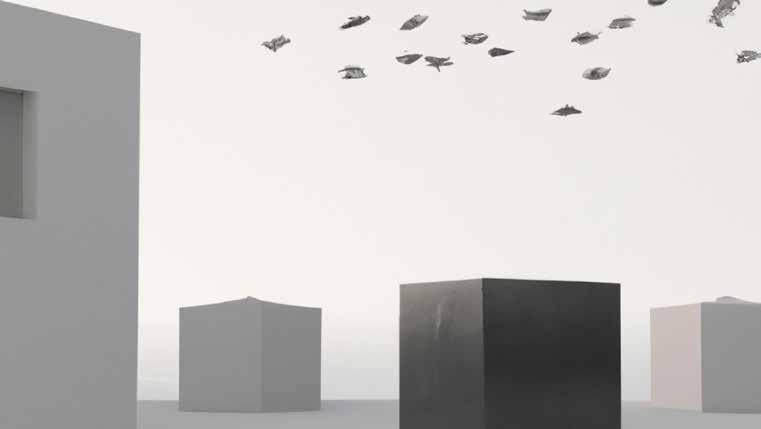
A non-Ahmadi lady wrote some of her and her brother’s dreams to Hazrat Amirul Momineen, Khalifatul Masih Vaa, seeking their interpretation. She also requested Huzoor-e-Anwaraa to answer some of her questions about the Jamaat. Furthermore, she sought Huzoor’saa permission to marry an Ahmadi young man.
Huzoor-e-Anwaraa, in his letter dated 22 August 2021, gave the following reply to her:
“As far as the marriage is concerned, if the young man also wishes to marry you, he should ask me for permission himself.
“You have sent me your and your brother’s dreams, in which white birds, white houses and the presence of the Kaaba in those houses have been especially mentioned. Seeing white in a dream means goodness, blessings, and purity of faith. Birds symbolise spiritual growth and development. Moreover, the presence of the Kaaba in a house indicates that the pleasure of Allah the Exalted is contained in that house and it also points towards the reformation of the religion of the family and towards their being safe from all kinds of fear.
“May Allah guide you to the path of truth and true Islam. May He enable you
to recognise the Messiahas of Muhammadsa who was sent in exact accordance with the prophecies of the Holy Prophetsa, to accept his claims with a sincere heart and to beautify your world and the hereafter by following his teachings. Amin
“Once the truth has been conclusively communicated, those who still depart this world without having believed in the Promised Messiahas, who was the most ardent devotee of the Holy Prophet Muhammadsa, may have to face many kinds of grief in the hereafter because they would have left this world without having obeyed the commands of Muhammad, the Chief of the Messengers, the Prophet of the Final Age, the Seal of the Prophets, the Holiest of Prophets, the Chosen One, peace and blessings of Allah be upon him. The description of your father seeing horrible scenes after his death in your dream hints at this warning. May Allah have mercy on him by enabling his children to recognise the truth and accept it and then offer supplications for him that are accepted by Allah the Almighty. Amin
“Other than that, as far as your questions are concerned, their detailed answers are available in the various books of our Jamaat, from where you can read them. I will provide you with their brief responses here.”

Muslim clerics and the Promised Messiahas
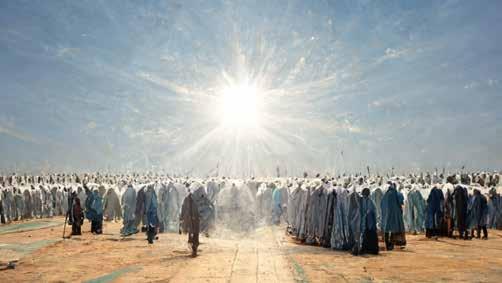
“It is not surprising that religious scholars and other Muslims who claim to be intellectuals do not see the fulfilment of the prophecies and signs that affirm the truthfulness of the Promised Messiahas, because faith is achieved by Allah’s grace, not merely by one’s knowledge and intellect. The greatest example of this is that a seemingly uneducated and illiterate slave like Sayyiduna Bilalra recognised the light of Prophethood of our Lord and Master,
the Holy Prophet Muhammadsa, whereas the chief of the valley of Mecca, who was referred to as ‘the father of wisdom’ (’Abu l-Hikam), did not recognise that light and was, thus, called ‘the father of ignorance’ (’Abu Jahl).”
La Nabiyya Ba‘di
“The truth about the Holy Prophet’ssa uttering the words
ا about himself was elucidated by Hazrat Aishara (about whom the Holy Prophetsa said, ‘Learn half of the knowledge of religion from Aishara!’) in the following words:
“‘Say he is Khatam an-Nabiyyin, but do not say that there is no prophet after him.’ (Musannaf Ibn Abi Shaybah, Juz’ 6, Hadith 2019)
“The reason for this statement of Hazrat Aishara was that after the passing of the Holy Prophetsa and the period of the RightlyGuided Caliphate, the misconception started to spread among people that the door of all types of prophethood had been closed after the Holy Prophetsa.
“Since Hazrat Aishara was also aware of the other glad tidings mentioned by the Holy Quran and the Holy Prophetsa about the Messiahas of Muhammadsa who was to be sent among the Akharin, in order to remove this misunderstanding that had arisen among the people in that era, she said that you should use the term Khatam anNabiyyin (Seal of the Prophets), that is, now, any prophet who would appear in the world, he would only follow the Holy Prophetsa and would come as a result of his blessings and would be subject to his sharia. She told the people, however, not to say that no
Friday 7 October 2022 | AL HAKAM10
يدعب يبن
هدعب يبن ال اولوقت الو ،نييبنلا متاخ اولوق
prophet of any kind could come after him because this was against the Holy Prophet’ssa status of Khatam an-Nabiyyin. The Holy Prophet Muhammad’ssa status of Khatam an-Nabiyyin is confirmed only when one of his followers [ummati] attains the position of a zilli, buruzi or ummati prophethood through the blessings of the Holy Prophetsa and owing to his following and obeying him.
“The Holy Founder of the Ahmadiyya Muslim Community, Hazrat Mirza Ghulam Ahmad of Qadian, the Promised Messiah and Mahdi, peace be upon him, while elucidating this fact, stated:
“‘I swear by God Who has sent me — and cursed be those who fabricate lies about Him — that He has sent me as the Promised Messiah. Just as I believe in the verses of the Holy Quran, so do I believe — without the least difference — in the manifest Revelation which has been revealed to me, and the truth of which God has demonstrated to me through repeated signs. I am ready to swear in the precincts of the Holy House of God [Baitullah] that the pure Revelation which descends upon me is the word of the same God Who spoke to Mosesas, to Jesusas, and to the Holy Prophetsa
“‘The earth has borne witness to my truth, as have the heavens. Both have proclaimed that I am the Vicegerent of God. But it was necessary, in accordance with the prophecies, that I should be denied. This is because those whose hearts are in veils do not accept the truth. I know that God will surely support me as He has always supported His Messengersas. No one can stand against me, because Divine support is not with them.
“‘Wherever I have denied being a Prophet or Messenger, it has only been in the sense that I have not brought an independent law nor am I an independent Prophet. I am a Messenger and Prophet only in the sense that I have received spiritual grace from the Messengersa whom I follow, and, having received his name for myself, and through him, I have received knowledge of the unseen from God. But I have not come with a new law. I have never denied being called a Nabi (Prophet) in this sense. Indeed, it is in this very sense that God has addressed me as Nabi and Rasul; and it is in this sense that I do not deny being a Nabi or Rasul. As for my statement:
“‘[I am not a Messenger and have brought no book.]’
“‘It only means that I am not a lawbearing Prophet.
“‘However, it must be borne in mind and should never be forgotten, that, despite being addressed as Nabi and Rasul, I have been informed by God that this bounty has not descended upon me directly. There is a holy being in heaven whose spiritual grace is with me and he is Muhammad, the Chosen Onesa. It is on the basis of this relationship, and by merging myself in him, and by receiving his names — Muhammad and Ahmadsa — that I am a Rasul as well as Nabi, which, in other words, means that I have been commissioned by God and I receive knowledge of the unseen from Him. Thus the Seal of Khatamun Nabiyyin remains intact, for I have received his name by way of reflection and Zill, through the mirror of love.’ (Eik Ghalati Ka Izala: A Misconception Removed [English], Tilford: 2007, pp. 9-11)
“In another of his works, he wrote: “‘Remember, our belief is that the Holy Quran is the Final Book and the Final Law, and until the Day of Judgment, no Prophet can appear who brings a new law or who receives revelation without having followed the Holy Prophetsa. In fact, this door is firmly closed until the end of time; however, the door to revelation received through obedience to the Holy Prophetsa is open until the Day of Judgement. That revelation which is the result of following the Holy Prophetsa can never be terminated. But law-bearing or independent Prophethood has now come to an end.’ (A Review of the Debate between Batalavi and Chakrhalavi [English], Tilford: 2014, p. 12)”
Khilafah ‘ala Minhaj anNubuwwah: Caliphate on the precepts of Prophethood
“‘
Khilafah ‘ala Minhaj an-Nubuwwah’ refers to the dispensation of the caliphate which is established on the precepts of prophethood to carry forward its works. In the Holy Quran, Allah the Exalted has promised this caliphate to the believers in the following words:
Khilafah ‘ala Minhaj an-Nubuwwah and it shall exist for as long as Allah decides for it to exist. Then He will take away (this blessing) when He decides to take it away. Then, (as per His decree), there will be a mordacious monarchy (under which people will feel dejected and oppressed) […] (Once that period has come to an end, as per His other decree), there will be an even more severe form of tyrannical despotism, until (the mercy of Allah will be moved and) He will bring an end to that period (of oppression and persecution) […] Then Khilafah ‘ala Minhaj an-Nubuwwah shall be established once again.’ Thereafter, he remained silent.
(Musnad Ahmad ibn Hanbal, Vol. 6, Musnad Nu‘man ibn Bashir, Hadith 18596, Beirut: ‘Alam Al Kotob, 1998, p. 285)
“In the above-mentioned Quranic promise and the sayings of the Holy Prophetsa, there were prophecies that when Allah the Exalted would establish Khilafah ‘ala Minhaj an-Nubuwwah in the ummah of Prophet Muhammadsa, there would also be established many worldly kingdoms and ‘caliphates’ among the Muslims. However, a sign of the Khilafah ‘ala Minhaj anNubuwwah would be that it would not be established by responding to extremists with extreme attitudes. It would also not be achieved by shooting and killing etc. among any two groups of the Muslim ummah Rather, that Khilafah was to be a caliphate established by invoking the mercy of Allah
the Exalted. And that Khilafah which was to be established as a result of the mercy of Allah the Exalted and His grace, was not only to be a means of love, of exchanging fears with peace and security, of guaranteeing the consolidation of the Faith, of establishing the Unity of Allah the Exalted in the world for its followers, rather that caliphate was also to be a guarantor of peace for the whole world and it was to draw the attention of governments towards justice and honesty, and it was to draw the attention of people towards fulfilling their duties with honesty and due diligence.
“Hence, just as the Rightly-Guided Caliphate that was established after the Holy Prophetsa did this work, the Ahmadiyya Caliphate that was established as a result of the advent of the Holy Prophet’ssa spiritual son, the Promised Messiahas, continues to do the same work in this era by the grace of Allah the Exalted.”
Minaratul Masih
“As far as Minaratul Masih is concerned, just as the previous prophets and messengers of God Almighty, during their respective eras, used to try to also fulfil prophecies in their literal form, following the Sunnah of the prophets and with the permission of Allah the Exalted, the Promised Messiahas initiated the construction of this minaret
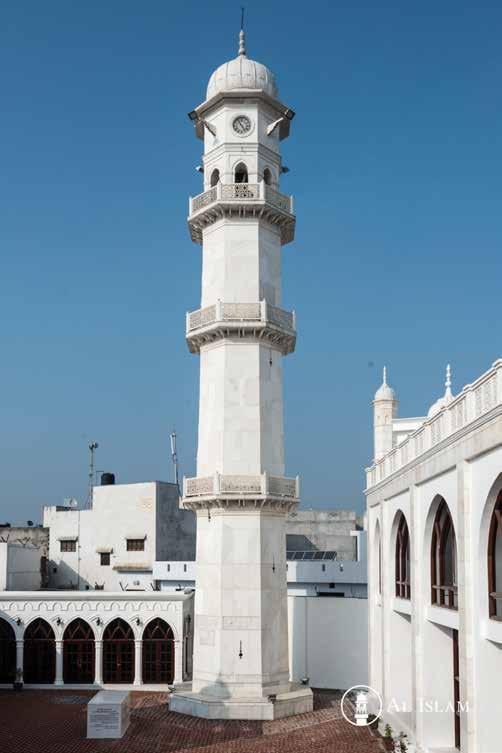
Continued on next page
“‘Allah has promised to those among you who believe and do good works that He will surely make them Successors in the earth, as He made Successors (from among) those who were before them; and that He will surely establish for them their religion which He has chosen for them; and that He will surely give them in exchange security (and peace) after their fear: They will worship Me, (and) they will not associate anything with Me. Then whoso is ungrateful after that, they will be the rebellious.’ (Surah an-Nur, 24:56)
“Furthermore, it is also stated in a hadith of the Holy Prophetsa that:
“‘There has never been a Prophethood which was not succeeded by Khilafat.’ (AlJami‘ as-Saghir by Jalal al-Din al-Suyuti, alJuz’ II, Egypt: 1306 AH, p. 126)
“In accordance with these divine promises, this dispensation of Caliphate on the precepts of Prophethood [Khilafah ‘ala Minhaj an-Nubuwwah] was first established among the believers immediately after the demise of the Holy Prophetsa in the form of the Rightly-Guided Caliphate. Then, after the advent of the Messiahas of the Holy Prophet Muhammadsa and his most ardent devotee, during the renaissance of Islam, this dispensation was re-established as per the prophecy of the Holy Prophetsa Our Lord and Master, the Holy Prophet Muhammad, the Chosen One, peace be upon him, describes this glad tiding in one of his sayings as follows:
“Hazrat Hudhayfah ibn al-Yamanra narrates that the Holy Prophetsa said, ‘Prophethood shall remain among you for as long as Allah decides for it to remain and then Allah shall lift it when He decides to lift it. After prophethood, there shall be
11AL HAKAM | Friday 7 October 2022
بکتا ما ہدرو � و لسور م�س�� من
مہنفلختسیل تحلصلا اولمع و مکنم اونما نیذلا ہللا دعو مہل ننکمیل و ۪ مہلبق نم نیذلا فلختسا امک ضرالا یف ؕ انما مہفوخ دعب نم مہنلدبیل و مہل یضترا یذلا مہنید کئلواف کِلذ دعب رفک نم و ؕ ائیش یب نوکرشی ال یننودبعی نوقسفلا مھ
ةفالخ اھتعبت الا طق ۃوبن تناكام
>>
to also fulfil the following prophecy of the Holy Prophetsa in its literal form:
“Hazrat Nawwas bin Samanra narrates a long tradition in which the Holy Prophetsa said, among other things, that:
Islam would reach the greatest of heights in the likeness of a towering minaret, and that the religion of Islam would prevail over all religions just as the voice of the one who makes the call to prayer, standing atop a tall minaret, dominates all other voices.
So, it was but destined that the same would happen in the time of the Messiah, as Allah the Exalted states:
catastrophe when the order of this world will be wrapped up. The death of every person is also a qiyamah for that person. The period of a prophet also serves like a qiyamah for his enemies when their false beliefs are defeated and the truth prevails.
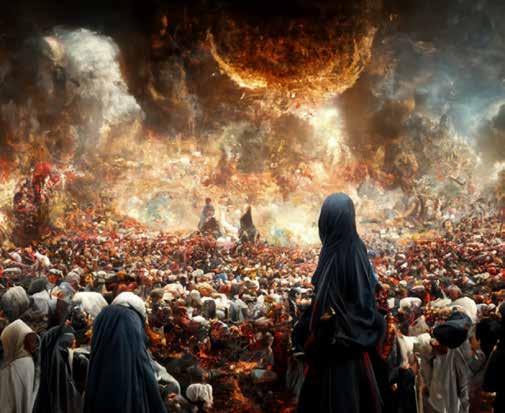
“The blessed era of the Holy Prophetsa was also a qiyamah for the people of Arabia, about which Allah the Exalted states:
تبرتقا
“‘When Allah will send the Messiah, son of Mary, he will descend at the white minaret east of Damascus.’ (Sahih Muslim, Kitab al-fitan wa ’ashrat as-sa‘ah)
“In order to fulfil this prophecy of the Holy Prophetsa in its literal form, many Muslim kings tried to build such a minaret. Hence, in 461 AH, a minaret was built in the Umayyad Mosque in Damascus, which was destroyed by a fire caused by the Christians many years later. In later periods, this minaret was rebuilt, but then both the minaret and the mosque were destroyed by fire. For the third time in 805 AH, the governor of Syria started the reconstruction of this minaret and it was named the Minaret of Jesus [...] [The dates and other historical details vary hugely depending on the sources one consults, with the common element in them being that the minaret was destroyed by fires or earthquakes etc. and later rebuilt several times throughout history. — The Editor, Al Hakam]
“The Promised Messiahas appeared in the town of Qadian which is located just east of Damascus. He also initiated the construction of a minaret to fulfil the literal aspect of the prophecy of the Holy Prophetsa However, that construction could not be completed during his blessed era due to unfavourable financial circumstances, but it was completed during the first two years of the caliphate of his second successor, Hazrat Mirza Bashiruddin Mahmood Ahmadra The minaret reached its completion in 1915. It still stands tall at the place of the advent of the Promised Messiahas and is known as Minaratul Masih i.e. the minaret of the Messiah. While highlighting the purpose and goal of the construction of this minaret, the Holy Founder of the Ahmadiyya Muslim Jamaat, Hazrat Mirza Ghulam Ahmad of Qadian, the Promised Messiah and Imam Mahdi, peace be upon him, states:
“‘In the Prophetic hadith, it was stated about the Promised Messiah that he would descend near the White Minaret [minarat al-baida’]. The purpose of this statement was to indicate that it was a sign of the time of the Promised Messiah that during his time, owing to the interconnectedness of the world, the development of roads, and the ease of assembly, it would be so easy for him to propagate God’s commandments, convey the light of faith and to call people to it, as if he were [able to do so merely] standing on a minaret [...] In short, the use of the term ‘minaret’ used for the time of the Messiah indicates that his light and voice would spread across the world very fast. And these facilities were indeed not available to any other prophet.’ (Majmu‘ah-e-Ishtiharat, Vol. III, 2019, p. 51)
“He further states:
“‘There is a hidden fact within the word ‘minaret’ itself, and that is that it is mentioned repeatedly in the Hadith of the Holy Prophetsa that the Messiah to come would appear as the Man of the Minaret. This signified that in his age, the truth of
“[‘‘He it is Who has sent His Messenger with the guidance and the Religion of Truth, that He may cause it to prevail over all religions.’ (Surah as-Saff, 61:10)]
“‘This verse is in favour of the Promised Messiah. The loud voice of the conclusive proofs of the veracity of Islam [hujjat alislam], under which all voices drown, has been reserved for the Messiah since eternity.
And since ancient times, the step of the Promised Messiah has been declared to be standing on that high minaret, higher than which there is no other edifice.’ (Majmu‘ahe-Ishtiharat, Vol. III, 2019, p. 52)
“He further states:
“‘It should be remembered that the main purpose of building this minaret is to fulfil the prophecy of the Holy Prophetsa
“‘The Hour (of the destruction of Arabia) has come, and the moon is rent asunder.’ (Surah al-Qamar, 54:2)]
“Likewise, the Holy Prophetsa said:
“‘My advent and the Hour’s are as (close to each other) as these (two fingers i.e. the middle and the index finger.)’ (Sahih Bukhari, Kitab at-talaq)
“Similarly, the sudden decline of a developed nation or the sudden advancement of a defeated nation is also referred to as qiyamah.
“The ahadith containing the mention of the Day of Resurrection forty years after the advent of Hazrat Masihas, i.e. the Messiahas of Muhammadsa, mean that over the last thousand years and especially before the advent of the Promised Messiahas, the state of Islam’s weakness and helplessness was
was being attacked incessantly by every religion and no one was coming forward to respond to those attacks. The most sacred and pure character of the Holy Prophet Muhammad, the Chief of the Infallible, the Mercy for Mankind, the Chosen One, peace and blessings of Allah be upon him, and his noble wives were being openly blasphemed against. At that time, the Messiahas of Muhammadsa, the most ardent devotee of the Holy Prophetsa, appeared in exact accordance with his prophecies and he robustly responded to every attack against Islam, as a result of which every enemy of Islam had to flee. Once again, Allah made Islam triumphant over all other religions by giving it the full glory and splendour it deserved. The Promised Messiahas said in praise of Islam and its Holy Foundersa:
In the past, a minaret was built twice on the eastern side of Damascus for this very purpose, which was later destroyed by fire. This is the same kind of purpose as when Hazrat Umarra had a companion wear gold bangles from the spoils of the Chosroes to fulfil a prophecy.’ (Majmu‘ah-e-Ishtiharat, Vol. III, 2019, p. 80, footnote))”
The appearance of the Messiah and the Judgement Day
“In the ahadith, which mention the coming of the Day of Resurrection forty years after the advent of Hazrat Isaas ibn Maryam, there are many things that require to be interpreted, as is characteristic of prophecies that many things in them require interpretation. Thus, first of all, the word qiyamah itself requires interpretation, since it appears in the Holy Quran and the ahadith of the Holy Prophetsa carrying different connotations: The word qiyamah has been used for the universal
“‘We wearied our mind by searching all around;
No Faith did we find like the Faith of Muhammadsa
There is no religion that can show such signs,
This fruit we ate only from Muhammad’ssa orchard.
We have experimented with Islam ourselves; It is light — pure light. Awake and see as we announce.
We looked at other Faiths, there was no light in them;
If we concealed the truth, would someone point it out!
We are tired of saying these things time and again;
We sent our invitations darting in all directions.
No one came to test it — not a soul, We challenged every adversary to come against us.’
[’A’ina-e-Kamalat-e-Islam, Ruhani Khazain, Tilford: 2021 , p. 224]
And there
nothing left of the Holy Quran except its words. Their mosques will apparently be full of people, but will be empty of righteousness.
be the worst creatures under
clerics
because fitnah will emerge from them and will return to them.’ (Shu‘ab al-Iman by Al-Bayhaqi, Fazl qala: yanbaghi li-talibi l-‘ilmi ’an yakuna ta’allumuhu wa li l-‘alimi ’an yakuna ta‘limuhu li wajhillah, Hadith 1858)
“Eminent Muslim scholars were leaving Islam and adopting Christianity, Islam
“So, this is that qiyamah that took place in favour of Islam and against its opponents through the coming of the Messiahas of Muhammadsa and through the Khilafah ‘ala Minhaj an-Nubuwwah established after him, as a result of which, Islam, the name of the Holy Foundersa of Islam and the true teachings, as presented by him, reached the ends of the world. By Allah’s grace, even today, this spiritual jihad [of peace] is advancing by leaps and bounds, as the land of Islam’s opponents shrinks day by day.
“May Allah guide you, grant you the ability to recognise and accept the path of truth and guidance, and may He always bless you with His bounties. Amin.”
(Compiled by Zaheer Ahmad Khan, Head of Records Department, Private Secretariat, London.
Translated by Al Hakam)
Friday 7 October 2022 | AL HAKAM12
ءاضيبلا ۃرانملا دنع لزنيف ميرم نبا حيسملا هللا ثعب ذإ قشمد يقرش
یلع ہرہظیِل قحلا نید و یدہلاب ہلوسر لسرا یذلا وھ ہلک نیدلا
رمقلا قشنا و ۃعاسلا
such that the following prophecy of the Holy Prophetsa had been fulfilled word for word: ،همسا ا إ مالسإلا نم ىقبي ال نامز سانلا ىلع يتأي نأ كشوي نم بارخ يهو ۃرماع مهدجاسم ،همسر الإ نآرقلا نم ىقبي الو جرخت مهدنع نم ءامسلا ميدأ تحت نم رش مهؤاملع ،ىدهلا دوعت مهيفو ةنتفلا “‘A time will come in the near future when there will be nothing left of Islam except its name.
will be
Their
will
heaven
نے ہم �تھکا کے اڑود کو فکر فطر ہر نے ہم �پا نہ سا ؐمحمد �د �د ئیکو ےوکھلاد ںنشا کہ �ا � ہبمذ ئیکو نے ہم �کھا ہی سے ؐمحمد غبا ثمر � �د کے کر بہتجر دخو کو مسلاا نے ہم نے ہم �سنا و�ھ �د ٹھوا رنو ہے رنو تھا نہ رنو کہیں تو �د جو کو ںو�د روا نے ہم �چھپا کو حق گرا ئےکھلاد ئیکو کہتے کہتے کو ںتوبا نہیا تو ہم گئے تھک نے ہم �چلا � کا ںتوعود فطر ہر چند ہر �آ نہ ئیکو لئے کے ئشمازآ نے ہم �بلا پہ بلمقا کو لفمخا ہر
<< Continued from previous page
Ode to Triumph Supreme
(John Alexander Dowie from his grave)
It’s been way more than a century
That defeat, my defeat, came in a cascade; To lay bare before the whole wide world My grand pretence and masquerade.
Elijah I am, and Messiah in one; A cure for all; this flamboyant claim, Had left enchanted across the world, Some thousands of men, and many a dame.
In fame I grew, in wealth prospered; In Illinois, I built a town, Where men, and trees and birds and streams, Would bow to me and worship my crown.
Each day a joy, every night a delight; I thought my bliss was here to stay. When one fine day, to my dismay, An epistle arrived from a land far away.
The signatory, an Ahmad, had cautioned me, That all my sham shall go in vain; The Messiah, he claimed, was he not me, And destined for me was shame and pain.
That piece of paper, I tore to shreds; How dare a man on earth may say, That gone are my days of glory and pomp, I screamed, “My sway shall never sway!”
But as days went by, and time flew past, My splendour began to melt away; I lost all friends and confidants, As if my fate had gone astray.
While I lay dying in my despair, There rose and shone the Indian Messiah; His song had spread on land and sea, And echoed the Rockies and Himalaya.
Today I twist and turn in my grave
As the air of Zion is jubilant; I hear, a son of Ahmad is here, And crowds around him, exuberant.
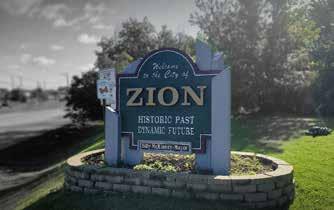
What was my throne, is now his mosque; Where I once reigned, is now his land. So joyous is he, as his aptronym; And so he must be, the occasion is grand.
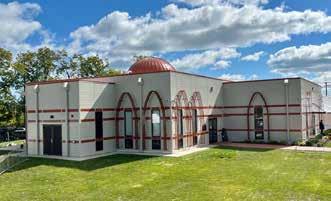
God! Raise me once, from my rotting vault, So I may stand before this man; And cry, “O Ahmad, thou art great!
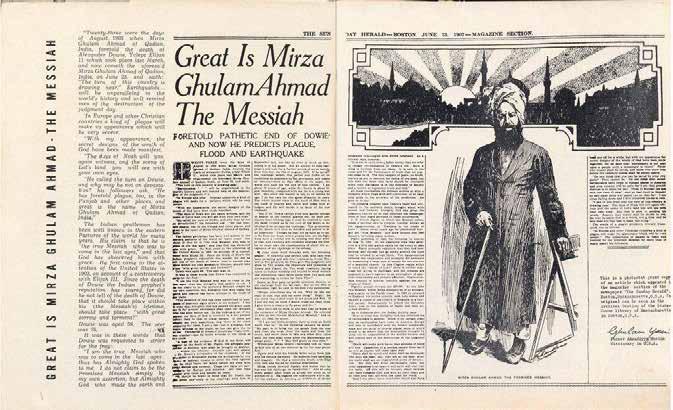
“All thine it is, my land and clan”.
With hand on heart, I swear, O Ahmad!
I wish I could today redeem, My pomp and pride, for pardon and grace As yours it is, Triumph Supreme.
13AL HAKAM | Friday 7 October 2022
English rendering of Asif Basit’s persona poem Dastan-e-Fath-e-Azeem
Zikr-e-Habib
4
Nubuwwat [prophethood] and muhaddathiyyat [station of being Divinely inspired]
During the conversation on the occasion of the feast [in Amritsar], Maulvi [Ahmadullah] Sahib presented this issue to the Promised Messiahas that, “It seems from some of your writings that you claim to be a prophet. For to this reason, people are deviating from the right path.” The Promised Messiahas explained what is meant by it [i.e. his claim of being a prophet]. Subsequently, Maulvi Sahib said, “Please write a note that wherever there is the word ‘nubuwwat’ [prophethood] in your writings, it does not in any way nullify khatm-e-nubuwwat [seal of prophethood] and it means muhaddathiyyat. The Promised Messiahas said, “Certainly, I will write it down.” Consequently, the Promised Messiahas put it on paper and gave it to Maulvi Sahib, which he kept with himself to show to those people who used to issue a fatwa [edict] of disbelief against the Promised Messiahas for the reason [that he broke the seal of prophethood].
[At the time of the above incident, the Promised Messiahas used to interpret his revelations regarding his nubuwwat and considered them to mean muhaddathiyyat However, soon after, the revelations of Allah the Almighty descended upon the Promised Messiahas like rain and assured him that he was indeed the appointed reformer of the age and a prophet of God.]
On one of those days, some troublemakers misled by the opposing maulvis came to attack the house where we were staying [in Amritsar]. They wanted to enter the zenana on the top floor of the house. However, a few Ahmadis who were present there bravely stood on the stairs and stopped them and later when the police arrived, those people dispersed.
[People flock to meet the Promised Messiah]
When the news of the Promised Messiahas reached Amritsar, several people from various cities came [to meet him]. Consequently, Muhammad Khan Sahib and Munshi Zafar Ahmad Sahib from Kapurthala stayed there for numerous days.
It was summer. As I and Munshi Sahib were both thin and of short stature, we used to lie down on the same charpoy. One night, around 10 pm, I went to the theatre, which was close to the house and after the show was over, I came back at 2 am. In the morning, Munshi Zafar Ahmad Sahib, in my absence, complained to the Promised Messiahas that Mufti Sahib had gone to the theatre at night. The Promised Messiahas said, “Once, I also
A beloved remembered
went there in order to find out as to what happens there.” The Promised Messiahas did not say anything else. Munshi Zafar Ahmad Sahib himself mentioned to me that, “I had gone to the Promised Messiahas with your complaint. I thought the Promised Messiahas would beckon and admonish you, but Huzooras only said that once he too went there and one gets to know many things.”
I said, “The Promised Messiah’s not saying anything is also an admonishment. Huzooras knew you would mention it to me.”
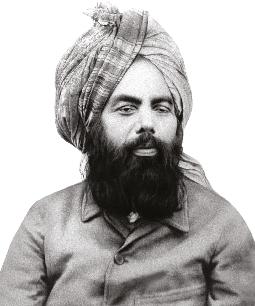
[Opponents did not succeed in Ludhiana]
After staying in Amritsar for several days, I left, but the Promised Messiahas stayed there for a few more days. Thereafter, when the Deputy Commissioner from Ludhiana wrote to Huzooras that he could stay in
Ludhiana like the other subjects and that he was not responsible for anything, the Promised Messiahas went back to Ludhiana. When we were staying in Amritsar, a letter was written to the Deputy Commissioner of Ludhiana and the aforementioned reply was thus received from him. It was also informed that Maulvi Muhammad Hussain Sahib Batalvi and other opponents had not succeeded in their plans.
[Journey to Lahore with the Promised Messiah]
It was probably the month of December in 1891 that I went to Qadian along with Khan Bahadur Ghulam Muhammad Sahib, who was a student at Jammu High School at the time, and one of my dear friends of the same name, Maulvi Muhammad Sadiq Sahib. These two companions wanted to take bai‘at

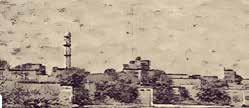
of the Promised Messiahas, so they both pledged allegiance in Qadian and then we
(peace be upon him)
Friday 7 October 2022 | AL HAKAM14
Part
بیبح رکذ
An old photo of Lahore
went to Lahore from Qadian along with the Promised Messiahas. We travelled in the inter-class of the train [i.e. the class between the second and the third], and then we reached the house from the Lahore station on a horse-driven carriage. In those days, horse-driven carriages were commonly used in Lahore. The Promised Messiahas first stayed at Miran Bakhsh Sahib’s house and after that, another house was rented. Upon the Promised Messiah’s arrival [in Lahore], there was great excitement in the city. A large group of people was always present at the house. The family members of the Promised Messiahas were also staying with him. When the Promised Messiahas would come out and sit in the gathering, he would deliver a brief speech and then answer the questions of people.
[Mahdi claimant]
During those days, there was a person in Lahore who claimed to be Mahdi, but the people believed him to be insane. He was not a scholarly person. He suddenly came to the Promised Messiahas in the marketplace and clasped him in his arms and started saying in a loud voice, “As I am the Mahdi, why have you claimed to be Mahdi?” Sheikh Rehmatullah Sahib grabbed him and pulled him back. The Promised Messiahas asked Sheikh Sahib to leave him alone and not be harsh on him. Since Maulvi Muhammad Sadiq Sahib and I had to go back to work, we only stayed there for a day or two and left. The Promised Messiahas stayed there for several days. I remember that Mian Khairuddin Sahib of Sekhwan was also accompanying the Promised Messiahas on this journey.
[Milk and curd shop in Qadian]
When I first went to Qadian at the end of 1890, there was only one shop that sold milk
and curd. The shopkeeper was a Hindu who used to bring a karahi [a small cauldron] of milk in the morning and from what was left by the evening, he would make its curd.
[Kasuf-o-Khusuf (solar and lunar eclipses)]
At the time when the prophecy of the solar and lunar eclipses was fulfilled in the month of Ramadan, I was still a teacher in the state of Jammu, but was in Qadian as there were some holidays [at school]. The Promised Messiahas had written an article about it. This article was printed and sent to Qadian, but the Promised Messiahas stopped it from being distributed and said, “Let the sun be eclipsed and then publish it. It is the work of Allah the Almighty and what can we say about it. It is possible that there occurs such a change in the sky that the sun may not be eclipsed.”
The year in which the sun was completely eclipsed and the whole sun was covered and the prophecy of تروک سمشلا اذا [“When the sun is veiled” (Surah al-Takwir, Ch.81: V.2)] was fulfilled, on that day, Salat-ul-Kusuf [the prayer performed during solar eclipse] was offered in Masjid Aqsa. Maulvi Muhammad Ahsan Sahib Amrohi led the prayer. When the worshippers carried out prayers while weeping and crying [during the Salat], an echo was produced in the dome of the mosque.
[Mirza Fazal Ahmad Sahib]
While I was still employed in Jammu, the Promised Messiahas sent a letter to me from Qadian stating that, “Mirza Fazal Ahmad is employed in the police department in Jammu. He has not sent any letters home for many days and his mother is very worried. You should enquire about his state and wellbeing and inform us by post.”
Then, on another occasion, a similar
letter was received again, and both times, I wrote back after enquiring about the situation. This incident happened around 1893-94.
Mirza Fazal Ahmad Sahib was the second son of the Promised Messiahas from his first wife. His physical features were very similar to Hazrat Sahibzada Mian Bashir Ahmad Sahib. He passed away childless.
When Mirza Fazal Ahmad Sahib died and the news of his death reached Qadian, the eyewitnesses say that sadness was visible on the face of the Promised Messiahas. The children were [playing and] setting off firecrackers and Hazrat Ummul Momineenra forbade them because the news of their brother’s demise had been received. The Promised Messiahas told Hazrat Amma Janra that, “They are just kids, what do they know about it! Let them play their games and do not stop them.”
[The Promised Messiah gave the copies of Surma Chashm-e-Arya]
Once, during the summer holidays, I went to Qadian from Jammu to meet the Promised Messiahas. Those were the days when Hazrat Maulvi Nuruddin Sahib, Khalifatul Masih Ira, had also migrated to Qadian and the construction of the house where he used to practise medicine had been completed. He used to sit there almost the whole day. Once, I was sitting in the company of Hazrat Hakim Maulvi Nuruddin Sahibra in that clinic when suddenly the Promised Messiahas came there alone. He had a few books in his hand. He sat down casually on the same mat where we were both sitting.
The Promised Messiahas addressed Hazrat Maulvi Sahibra and said, “I had these few copies of Surma Chashm-e-Arya in my possession. I have brought them so that you can distribute them according to the need.” I said, “Huzooras, I would like to have one.”
The Promised Messiahas immediately gave me a copy. This is the same copy that is still preserved in the Sadiq Library.
[An interesting encounter with a British police officer]
One day in the morning, suddenly a British man wearing the uniform of a police superintendent arrived at Qadian and said, “I am the Superintendent of Police of Gurdaspur and have come to meet Mirza Sahib.” At that time, the building where the clinic and the press are located had been built, and where the guest house is situated now, another building was present there. In between those two buildings, there was only a small platform built on the site of the old wall of the city. He was seated on a chair on that platform and another chair was placed there for the Promised Messiahas. On being informed, the Promised Messiahas came out with a staff in his hand, as was his usual practice and sat on that chair. “I want to ask you something,” said the British officer. The Promised Messiahas said, “Please ask.” He took out a small book from his pocket and started flipping through its pages. He would turn over its pages one by one with great care. It was as if he was looking for those questions he wanted to ask which were written in that pocketbook. He looked through the entire pocketbook and then started from the opposite side to the first page. He then closed it and put it back in his pocket without asking any questions. Thereafter, he stood up and said, “I could not find those questions at the moment. Alright then, I will come back another time perhaps.” He said salaam and left, but he never came back again.
(Translated by Al Hakam from the original Urdu in Zikr-e-Habib, pp. 14-17)
Annual Ijtemas of Khuddam and Atfal in Kenya
Tahir Ahmad Machengo Kenya Correspondent
Majlis Khuddam-ul-Ahmadiyya and Majlis Atfal-ul-Ahmadiyya Kenya held their 38th and 8th annual Ijtemas respectively at the Jamaat’s headquarters located in Nairobi from 16-18 September 2022.
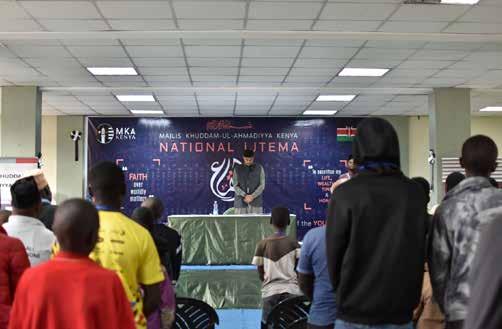
The theme for this year’s Ijtema was, “Khilafat: An embodiment of Allah’s Unity”.
The members were enthused, having stayed for long without holding an Ijtema due to the Covid-19 pandemic. The members gathered in the mosque to watch the live Friday Sermon of Hazrat Khalifatul Masih Vaa. This was followed by a flag hoisting ceremony led by Amir and Missionaryin-Charge Kenya, Tariq Mahmood Zafar Sahib, after which he led everyone in silent prayer. Khuddam and atfal then proceeded to the Ahmadiyya Hall for the opening session, which was chaired by Farouq Zaid Sahib, Sadr Majlis Khuddam-ul-Ahmadiyya Kenya.
The session began with the recitation of
the Holy Quran and its Swahili translation, followed by a poem, pledges and an address by Sadr sahib.
After concluding his address, Sadr sahib led a silent prayer. This was followed by a speech by Tahir Ahmad Sahib about the importance of obedience to Khilafat.
All Atfal then returned to the mosque for the official opening of their Ijtema. On the other hand, Khuddam remained in the Ahmadiyya Hall for academic competitions.
After the prayers, both Khuddam and Atfal proceeded to the Ahmadiyya Hall for a session on First Aid. They were given first aid training in dealing with nose bleeding, epilepsy attacks and food poisoning. A question and answer session was also held.
The second day of Ijtema commenced with tahajjud and Fajr prayers, followed by dars of the Holy Quran. After breakfast, members proceeded to the field for sports competitions.
In the evening, khuddam were given a talk about “Marriage in Islam” and the atfal were given a talk about the Waqf-e-Nay scheme.
During the closing session of the Ijtema, chaired by Amir and Missionary-inCharge, Tariq Mahmood Zafar Sahib, Sadr sahib read out the Ijtema report which was
followed by the awards distribution. Amir sahib concluded the Ijtema with a silent prayer. A total of 251 khuddam and atfal attended the Ijtema.
15AL HAKAM | Friday 7 October 2022
100 Years
Worldwide preaching efforts and collaboration of Ahmadi missionaries
Ago... America
The Review of Religions [English], October & November 1922
Brother Dr Sadiq is now much better, and the mission work is proceeding apace. Sympathy, that should be the keynote of a missionary’s life, is to be found to a prominent degree in our brother. Hearing that a great tornado swept off a portion of San Salvador and the death toll was very heavy, the brother lost no time in writing a letter of sympathy to the President of the Republic conveying the message of Ahmad who he said was the Noah for this age.
During the last two weeks, our brother delivered seven lectures and secured eleven more new converts to Islam. Idul Zuha was observed on Friday, 4 August [1922], the assemblage consisting of 40 persons, men and women. The tramway strike is much interfering with our brother’s missionary activities.
[Al-Masjid Chicago]
For our present purposes, the mosque has been completed and fitted up with the necessary fixtures. “Almasjid Chicago” is the telegraphic address which has been registered at the post office. Now telegrams can be received directly at this address.
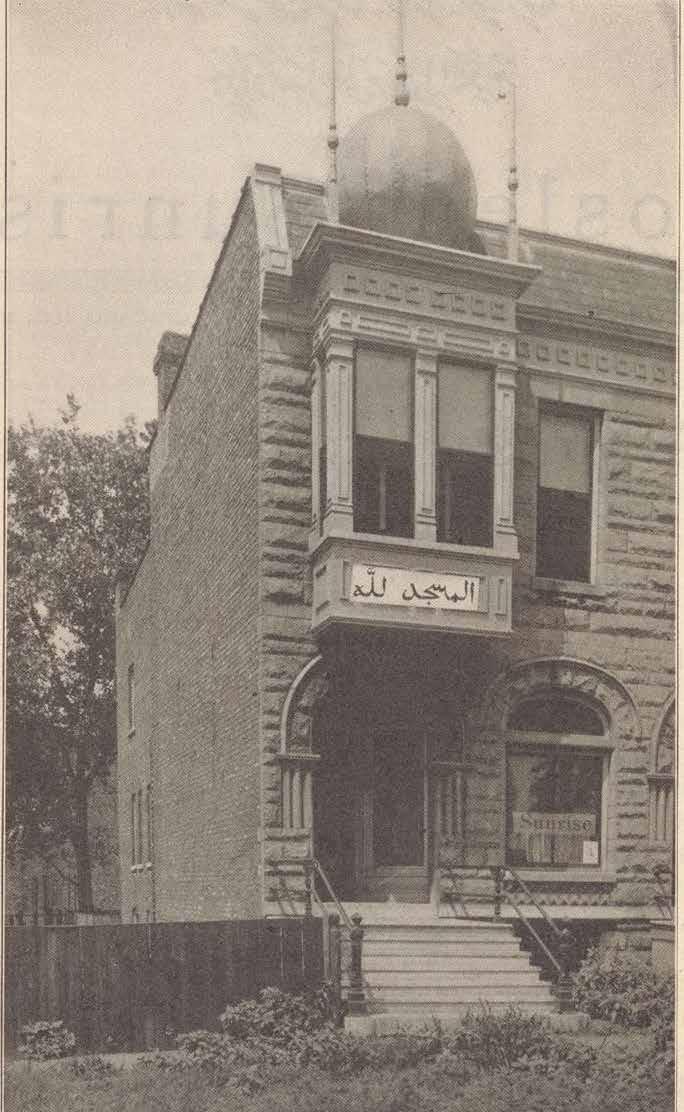
“The Moslem Sunrise” has been registered at the post office and now it enjoys the same postal facilities that are accorded to other papers, thus appreciably lessening the postal charges. The sum of one thousand dollars that was to be paid as the first instalment towards the price of the house that has been turned into a mosque has already been supplied to our brother who, has managed to meet other needs from the local funds and it is hoped that the remaining instalments will be met by the local members. The present, and it is devoutly to be hoped the permanent address of our American Mission is as follows: 4448 Wabash Ave, Chicago, Ill, America.
[Class difficulties in the West]
Among the difficulties that our brother had to meet with, the chief one is the social distance between one class from the other. People of high standing and status do not, as a rule, mix with the middle-class people and vice versa; the one is inspired by undue pride and the other by undue hatred and jealousy.
So, in his choice of a central locality, our brother had to keep in view this class antagonism and rivalry. It is yet too early to speak whether his choice will meet the demands of both. It is as a matter of fact this class hatred that Islam aims at rooting out, but in view of the prevailing prejudices, our brother has had to keep the interests of both in mind.
As Islamic ideas permeate, we hope that this class antagonism will give way to Islamic fraternity and equality. And then will dawn a new and a happier era for the
people of the West.
Africa […] Opening of schools
The council of elders as well as the executive committee at Lagos, [Africa], have decided to open the Talim-ul-Islam Ahmadiyya School. For the time being, the female prayer apartment of the chief mosque with slight alterations is being used as a schoolroom as well as the prayer apartment.
A senior Cambridge master and his three assistants form the staff of the school. An application for the acquisition of a site for the proposed high school has been placed with the government. The high level of expenses may be gauged from the fact that
the land for house construction costs three times as much as in London.
In spite of the fact that there have been more than 200 applications for an open site, the government has promised to consider our Community’s application and give it preference over others.
In addition to this, there is also a proposal to start a school at Epetado. Now that the Christians of Lagos have decided to exclude Muslim students from their schools, hence in future it seems that the Ahmadiyya Movement will have to bear the cost of Muslim education.
Some of the hostile Christian papers have begun to take favourable notice of our Movement. For instance, the “Pioneer” of Nigeria that up to now maintained a very
hostile attitude, in its latest issue speaks admiringly of the Movement and says that the sole avenue of Muslim regeneration lies in the teachings of Ahmadiyyat. Mr Nayyar, it proceeds, not only convinces by arguments and reasons but also by emphasising loyalty and faithfulness to the established government he is doing very useful work.
Similarly, the “African Messenger” says that through the influence of Ahmadiyyat a good deal can be achieved by way of reformation and regeneration among the Muslim masses provided selfish and vested interests do not come in between brother Nayyar and his reforming activities. Elsewhere, the same paper urges upon the government and its readers the need of welcoming this purely religious movement and quotes with approval the remark of a high-placed government official who said that he welcomed the Ahmadiyya Movement and expressed his belief that if the Muslims there imbibed the Ahmadiyya teachings and Islamic point of view and acted up to them, he was sure they would very soon rid themselves of the dense curtain of ignorance and fanaticism which had up to this time characterised their general activities. He averred, moreover, says the paper, that there were certain interested parties that did not wish to see the benighted Muslims get out of their rut of ignorance, their sole motive being exploitation.
Hakim Fazl-ur-Rahman
Brother F Rahman in spite of physical infirmities is devoting himself heart and soul to his propaganda [preaching] work. He teaches Quran to the Saltpond Muslims and young Hausas; he instructs the teachers and the taught at Saltpond in the rudiments of religion; he is inspecting various communal centres; and moreover, he is busy devising means whereby a network of schools might be spread over the whole of that ilaqa [region]. He generally travels on foot, contenting himself sometimes with eating parched millet or dry bread with salt to point. In spite of the heavy rains and indisposition, he does not spare himself; he is where his duty requires him. As reported in our last issue, he has been successful in securing 117 more new converts.
In addition to Brother Fazl-ul-Rahman, there is Imam Muhammad Ismail Sheta who plies his trade and propagation work together. He writes to say that he was going into the interior of French Dahomey where, in addition to his business, he has a mind to preach the gospel of truth, [i.e. message of the Promised Messiahas], among the natives.
[…]
Mauritius
Brother Hafiz Ghulam Muhammad, our Mauritius missionary, writes that two more
Friday 7 October 2022 | AL HAKAM16
new converts have been secured.
A well-known Madrasi Hindu citizen of Rosehill invited the whole of Rosehill Ahmadiyya Community to a rich feast and to prepare Muslim dishes he requisitioned the services of a Muhammadan cook. The whole assemblage while assembled at the gathering were besprinkled with precious sweet-scented waters and essence of rose. In short, nothing was left undone to make it a perfect Eastern gathering.
The postprandial speeches that followed exhibited warm and sincere outpourings of the hearts. Brother Ghulam Muhammad proposing a vote of thanks to the kind host remarked that they, the Ahmadis, felt thankful to God for the fact that, though outcasted and excommunicated by their own fellow Muslims, they could count as their brethren the Hindus who so warmly and affectionately welcomed them. He, therefore, urged upon his kind host the necessity to extend the same liberality of thought and breadth of vision to the Quranic teachings as he had done in inviting them to a sumptuous dinner. If his kind host found, our brother proceeded, that the Quranic teachings are based on truth and wellestablished arguments, then it was only in the fitness of things that he joined the fold of Islam and thus once more establish that his high-mindedness and generosity were not simply confined to the worldly things and material considerations. We are all, he said, the creation of God, who wishes us to sympathise with each other.
We, the Ahmadis, recognised all the messengers of God, be they Indians or non-Indians. Rama and Krishna were both prophets of God who were raised to lead men to the right path of God. The only difference between us and the non-Ahmadi Muslims was that we recognised all these messengers and that according to our point of view, none of these former prophets was now alive, as is mistakenly believed by a certain people and that the prophet of the present age was Mirza Ghulam Ahmad[as] of Qadian. Spiritually we believe all these holy personages to be alive, but so far as corporeal existence is concerned, we make no exception in favour of anyone.
This short speech by our brother was followed by the host, who in the first place confessed with all humility that he had not done all that should have been

done in honour of his honoured guests. He, moreover, appreciated the honour of having under his roof no less a personage than our brother whose fame had gone far beyond the confines of Mauritius, and as to their island home, there was no house but remembered and knew our brother’s most striking personality.
Then he thanked once more all his guests, one and all, and asked permission to garland our brother as a fitting end to that evening’s gathering.
[Ahmadi Missionaries stay in contact and learn from one another]
It is more gratifying to learn that our various missionaries abroad are keeping in touch with each other relative to the progress of their work and the methods pursued. Brothers Dr Sadiq and Professor Nayyar are in constant communication with our Mauritius missionaries. Professor Nayyar requiring French literature on our Movement for his French Dahomey Mission branch was at once supplied with requisite booklets and pamphlets.
Similarly, to brother Fazl-ur-Rahman at Saltpond, was despatched literature in French with which our Mauritius Mission seems to be well supplied. French being the first language of Mauritius our brother has with assiduous care mastered it, and it is to his untiring energy and devotion that we have French literature also available.
It would not be out of place to state here that our Mauritius Community, no less than brother Ghulam Mahammad, deserves the best thanks of our whole community for the energy and devotion that they are showing in the cause of truth.
Brother Ghulam Muhammad and Hafiz Ubaidullah do not merely confine their activities to preaching alone. They are looking after the moral and spiritual upliftment of their brethren too. There are regular Quran classes, some of which have made marked progress.
Idul Zuha was observed on Saturday, 5 August [1922], with brother Ghulam Muhammad visiting Phoenix the same evening. A Hindu Mehta who knows Gujarati very well has recently joined our Movement. He is an intelligent young man and he has with avidity devoted himself to a further study of religion.
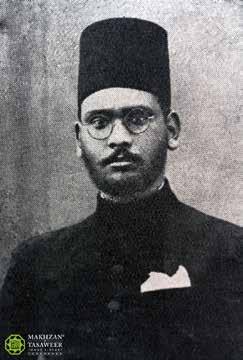
Egypt
Brother Sheikh Mahmud Ahmad writes from Cairo:
It is four months since I have been here. All this time, I have been busy doing my mission work in one way or the other. Up to this time no opposition has been set up to my missionary activities. If ever I have met with any obstacles, these have been at the hands of my Indian compatriots residing here. Yet Divine providence has been wonderfully in evidence in support of me. Thank God some of my bitterest foes have turned into the fastest of friends; such power has been vouchsafed to me in the performance of this divinely ordained duty. Glory be to God!
Mian Rahmatullah, an Indian tailor who has been residing in Cairo for a good many years, has with his whole family entered into the bai‘at of the Second Khalifa, [Hazrat Mirza Bashiruddin Mahmud Ahmadra]. He says that he joined the Movement in
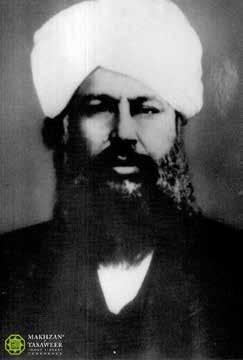
the lifetime of the Promised Messiah[as], but time and distance had kept him out of touch with the Movement.
There is another, Hamid Abdul Aziz, a native of Egypt. He is a poet and has a perfect command of speech. He is a good lecturer too, and he is said to have worked under Zaghlul Pasha while political demonstrations were at their height in this country. This young man has joined our Movement and he is sincerely and ardently devoting himself to the work of propagation.
He has taken to public preaching and he keeps in touch with me and consults me on every point he feels any difficulty about.
It is to be devoutly hoped that God will vouchsafe these new converts constancy and firmness in faith.
in this town [of Alexandria]. Five of those who were converted at his hands, it is to be deeply regretted, had been carried off by death. Among the survivors, there is a young man, Muhammad Wasfi by name, who is very zealous and ardent in the cause of Ahmadiyyat. Through his efforts the number of our Alexandrian Community counts more than twenty, one of them a Bey who joined our movement during the week under report.
Muhammad Wasfi
He is a young man with a saintly life. He is in the government service. In his off time, he is busy with his religious work. He came over to me from Alexandria on 22 of July [1922] and long did we discuss over the methods and means of propagation. I drew his attention to the regular organization of his Alexandrian brethren-in-faith into a regular community by establishing a regular Anjuman. Brother Wasfi has promised to set apart a portion of his house for this communal business where the opening ceremony was to take place and the work of propagation taken in hand.
It is to be hoped that the Alexandrian brethren will take to subscribing regularly to carry on the missionary work. Brother Wasfi has invited me to Alexandria which I hope I shall be able to do in the next month and stay there for a day or two.
Egyptians
These people are steeped in European fashion. Religion is almost forgotten. Female dress is immodest. The ulemas [religious scholars] are no better off than their lay brethren. One day, I had to see a friend of mine who happened to be in a coffee house. To my confusion and dismay, I found the learned gentlemen playing billiards.
Alexandria
Through the efforts of brother Abdul Karim an Ahmadiyya Community was established
(Transcribed and edited by Al Hakam from the original published in The Review of Religions, October and November 1922)
17AL HAKAM | Friday 7 October 2022
Hazrat Hafiz Ghulam Muhammadra
Sheikh Mahmud Ahmad Sahib, son of Hazrat Sheikh Yaqub Ali Irfanira
All Ahmadis must preach Islam to the world: Hazrat Musleh-e-Maud’s advice to the Jamaat
“Thus, this duty is amongst the fundamentals of Islam and therefore, it is our responsibility. We are required to pursue this objective through various means, which need huge expenses and the establishment of missions at various places.” (Ibid, p. 416)
Huzoorra continued by saying Ahmadis were required to offer financial sacrifices and devote themselves to tabligh in different parts of the world.
While mentioning America, Huzoorra said that, Hazrat Mufti Muhammad Sadiq Sahibra was working day and night to propagate the message of Islam Ahmadiyyat. However, there was a dire need to send more missionaries to achieve the desired results.
Huzoorra continued:
“We can never abandon tabligh [preaching the message of Islam] – it is the duty of every Ahmadi.” (Ibid, p. 418)
During his Friday Sermon on 27 May 1927, Huzoorra said:
“Our desire and endeavours are to bring the whole world within the fold of Islam. [...] I have propagated the message of Islam to various countries outside of India. For instance, currently, there are thousands of Muslims in West Africa who have accepted Islam through the efforts of the missionaries I sent there. Similarly, there are many who have proclaimed the kalima [Islamic creed] in Europe and America as well.” (Khutbat-eMahmud, Vol. 11, pp. 123-125)
During his Friday Sermon on 10 November 1933, Huzoorra said:
While expressing his determination to spread
message of Islam, Hazrat Mirza Bashiruddin Mahmud Ahmad – al-Musleh al-Maudra
one of his
are clear indications of the propagation of Islam [all over the world]. Our missionary [Hazrat Mufti Muhammad Sadiqra] would have reached America by now, insha-Allah Similarly, there is progress in Africa and Ceylon [now Sri Lanka], and propagation [of Islam] is going on in Germany. […] Islam is progressing in Russia as well since the seed has been sown there and the people are seeking missionaries from us. […]
to attain peace in this life alone. However, we strive to attain peace in this world and the Hereafter as well. [...] Therefore, every member of the Jamaat must make efforts with full passion and zeal.” (Khutbat-eMahmud, Vol. 7, pp. 359-360)
“[In the early days of Ahmadiyyat] there was a time when the number of Ahmadis around the world was even less than those present here for Jumuah prayer today. However, the Jamaat was still progressing and the people were inclining towards the Jamaat, so much so that the fame of Ahmadiyyat even reached Europe and America.” (Khutbat-e-Mahmud, Vol. 14, p. 273)
propagate
go wherever we
truthfulness of Islam
With this fervour, Hazrat Musleh-eMaudra pushed forward the mission of the Promised Messiahas to establish true Islam all across the world and for this, sent Ahmadi missionaries far and wide. He urged and motivated Ahmadis to carry out tabligh, no matter what profession or location they were in.
During his Friday Sermon on 13 February 1920, Huzoorra said:
“The name of the Promised Messiahas had spread all over the world within a few years, and there is no part where his name has not yet reached. Look at that town [of Qadian] and then ponder over the fame it has attained through the Promised Messiahas. […] Now, by the sheer grace of God Almighty, there
“The days are approaching for the fulfilment of the prophecy that the sun shall rise from the West:
“[The Hour will not be established till the sun rises from the West. (Sahih al-Bukhari, Kitab al-Tafsir, Hadith 4635)].” (Khutbat-eMahmud, Vol. 6, pp. 393-394)
During his Friday Sermon on 8 September 1922, while advising the Jamaat to propagate Islam, Huzoorra said that, Ahmadis had a great objective in front of them:
“We have a huge task in front of us; we have the responsibility to make efforts [for the propagation of Islam] in England, India, America, France, Germany, Russia, Kabul, Iran, and China. In fact, we must make efforts in the whole world. [...]
“[The materialistic people] make efforts
During his Friday Sermon on 24 November 1922, while advising the Jamaat to offer sacrifices for the propagation of Islam, Huzoorra said that God Almighty had given them the task to propagate the message of Islam all over the world:
is one of the great aims and objectives of Islam, as it is stated:
Huzoorra added that this was all due to the grace and succour of Allah the Almighty.
During his Friday Sermon on 9 March 1934, while mentioning the Ahrar’s opposition, Huzoorra said, members of the Jamaat were required to utilise the means of tabligh to overpower the Ahrar’s opposition since this was the method which would enable the Jamaat to become victorious the world over. Huzoorra said:
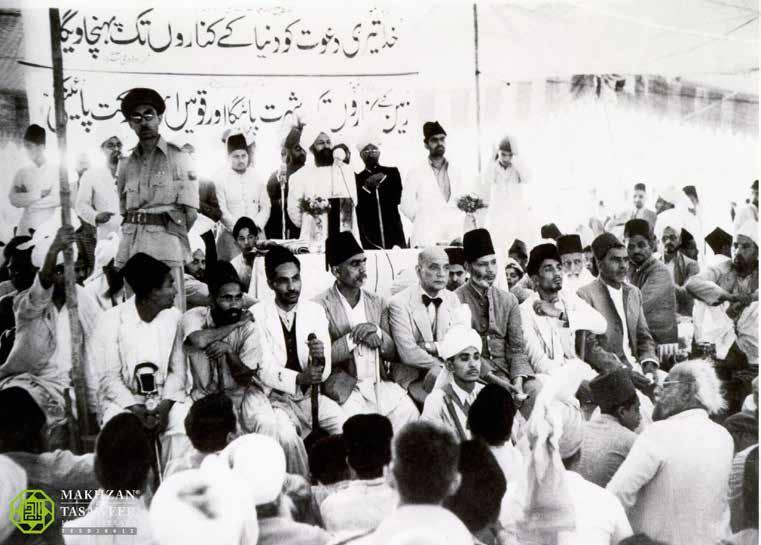
“Therefore, go and preach to them [the message of Ahmadiyyat] and explain to them the fresh signs of God Almighty which are being manifested in the world.” (Khutbat-e-Mahmud, Vol. 15, pp. 79-80)
During his Friday Sermon on 23 November 1934, Huzoorra said:
that person
the Holy
“Therefore, the purpose behind the establishment of the Ummat-e-Islamiyyah is to unite mankind on one hand. [Worldly] people establish various societies to unite people on one platform. However, they are ‘unaware’ of the person who had proclaimed that the sole purpose behind his advent was to unite the world, and for this objective, established
“A nation requires to spread in times of trouble. In the Holy Quran, Allah the Almighty tells Muslims that if there was passion [from the opponents] against the Muslims in Mecca, then why did they not go out and spread to other countries? If they
Friday 7 October 2022 | AL HAKAM18
Ata-ul-Haye Nasir Al Hakam
the
– states in
couplets: ہو بھی کچھ مسلاا ِقتاصد گے �ا� � ےپڑ ناجا کہ بھی ںجہا ہم گے �جا “We will
the
at any cost, we will
might need to.”
[اھبرغم نم سمشلا علطت ىتح ةعاسلا موقت ال]
“It
نوہنتو فورعملاب نورمات سانلِل تجرخا ۃما ریخ متنک رکنملا نع “‘You are the best people raised for the good of mankind; you enjoin what is good and forbid evil.’ [Surah Aal-e-Imran, Ch.3: V.111]
a Jamaat;
is
Prophet Muhammadsa
went out, Allah the Almighty would open many avenues for their progress. […]
“How do we know where our Medinite life [referring to the prosperity of Muslims after migrating to Medina] begins? Qadian is indeed our religious centre, but I don’t know where our centre of glory and power is. It could be in any other city in India, and it could be in China, Japan, the Philippines, Sumatra, Java, Russia, the United States, or any other country in the world. So when we find out that people are seeking to humiliate the Jamaat for no reason, they want to crush us, then it becomes our duty to go out and find out where our Medinite life begins.” (Ibid, pp. 433-434)
During his Friday Sermon on 15 March 1935, Huzoorra quoted the following verse of the Holy Quran:
“And when the Prayer is finished, then disperse in the land and seek of Allah’s grace.” (Surah al-Jumuah, Ch.62: V.11)
Commenting on this verse, Huzoorra said:
“There is a ‘permission’ from Allah the Almighty to disperse after the Jumuah prayer. However, it was to turn into a ‘commandment’ during the seventh millennium when the Promised Messiah would come, in other words,
would mean to disperse in the land for tabligh [preaching]. [...]
“During the time of the Holy Prophetsa, God Almighty had revealed that Medina was the most suitable place for the propagation of Islam. [...] In this era, God Almighty wants us to disperse to all countries of the world and to search for a country that could serve Ahmadiyyat as ‘Medina’. For this purpose, when we will disperse to various countries of the world, we will be sowing the seed of Ahmadiyyat in all countries, and thus, the Will of God Almighty to spread Ahmadiyyat in all countries of the world will be fulfilled. [...]
“We will go to Japan and China and convey to them the message of Ahmadiyyat. However, some of them may accept the message and others may reject it. [...] Similarly, we will go to Russia, Afghanistan, Iran, Arabia, the Philippines Islands, Sumatra, Java, Nepal, Jordan, and America, and convey to them the message of Ahmadiyyat. We will also go to the European states for the tabligh of Ahmadiyyat. [...]
“Therefore – since this is the age of tabligh – thus, God Almighty has not specifically named any country to be the most suitable for the propagation of Ahmadiyyat, rather, in the words
[And seek of Allah’s grace], Allah the Almighty has declared it an obligation for us to seek that ‘grace’.” (Khutbat-e-Mahmud, Vol. 16, pp. 200-205)
During his Friday Sermon on 28 June 1935, Huzoorra said:
“Whether the opponents consider our Jamaat to be ‘worthless’ or declare that ‘this community is small in numbers’, it is certain that one day they will have to acknowledge the significance of this Jamaat. [...]
“Jamaat-e-Ahmadiyya is present in various countries, such as India, Ceylon [now Sri Lanka], the Straits Settlements, Afghanistan, Iran, Iraq, Arabia, Palestine, Syria, Egypt, China, Sumatra, Java, Austria, Africa, Kenya, Uganda, Natal, Gold Coast
[now Ghana], Sierra Leone, Nigeria, etc.
“Our Jamaat is also present in that part of Africa which was anciently called German Africa, then in Mauritius, the United States of America [...] Belgium, England [...] and Russia as well. There is no continent of the world where our Jamaat is not established. This is the factor that indicates a community’s strength in the world.” (Ibid, p. 370)
During his Friday Sermon on 27 November 1942, while outlining the objectives of the Tahrik-e-Jadid scheme, Huzoorra said:
“We need men. We need funds. We need determination and perseverance and we need prayers that will shake the throne of God Almighty; the combination of all these is called Tahrik-e-Jadid
“Tahrik-e-Jadid has been initiated so we can accumulate such funds which could help us in easily and conveniently conveying the name of God Almighty to the corners of the world.
“Tahrik-e-Jadid has been initiated for the purpose of having people who dedicate themselves to the propagation of the religion of God and spend their lives engaged in this task. […] We will certainly need to send some people to Europe, America and Japan and they will have to devote their whole lives to this cause. [...]
“Members of the Jamaat are proud that Sahibzada Abdul Latif Sahibra Shaheed sacrificed his life for the Jamaat. However, we do not need only a single Abdul Latif to revive the Jamaat; instead, hundreds of Abdul Latifs are needed who should go out to different countries and sacrifice their lives for Islam and Ahmadiyyat. Unless [people like] Abdul Latif are born in every country and every region, the grandeur and majesty
of Ahmadiyyat cannot be established until that time.” (Khutbat-e-Mahmud, Vol. 23, pp. 522-525)
During his Friday Sermon on 18 January 1952, while shedding light on the objectives of Tahrik-e-Jadid, Huzoorra said:
“The work of Tahrik-e-Jadid is neither limited to a few years, nor the duty of a few people only, but rather this scheme has been initiated to achieve the victory of Islam over all other religions – which is the core objective behind the establishment of Ahmadiyyat. [...]
“During the Latter-Days, Islam was to pass through difficult times [according to the prophecies of the Holy Prophetsa], which would have ‘damaged’ its greatness and glory, and the opponents would have the opportunity to raise allegations against Islam and to disrespect it. After that, Islam was destined to regain its glory and reach such a position that would make the opponents disappointed.
“And the responsibility [to help Islam regain its glory and greatness] lies on everyone who claims to be a Muslim and Ahmadi. Therefore, in regards to the task of achieving Islam’s victory over the entire world and the spread of Ahmadiyyat, a Muslim and Ahmadi can never say that ‘it is someone else’s duty, not mine’. This is the duty of every Ahmadi and it will continue in every era till the Day of Judgement. [...]
“The only method to achieve the victory of Islam over all other religions is to perform tabligh. [...] This is the Jihad which is incumbent upon the Muslims forever. [...] The Jihad which was presented by the Promised Messiahas and which is being followed by us [in this era] can never end. [...] Jihad means to reform oneself and to carry out tabligh for converting people to
Islam. [...]
“You should tell every Ahmadi that those who participate in [the sacrifices under the scheme of] Tahrik-e-Jadid, in fact, fulfil the purpose behind the establishment of Ahmadiyyat. [...] We will have to offer sacrifices for the sake of Islam since our God has entrusted to us the responsibility [to propagate Islam to all corners of the world].” (Khutbat-e-Mahmud, Vol. 33, pp. 12-16)
During his Friday Sermon on 20 January 1956, Huzoorra said:
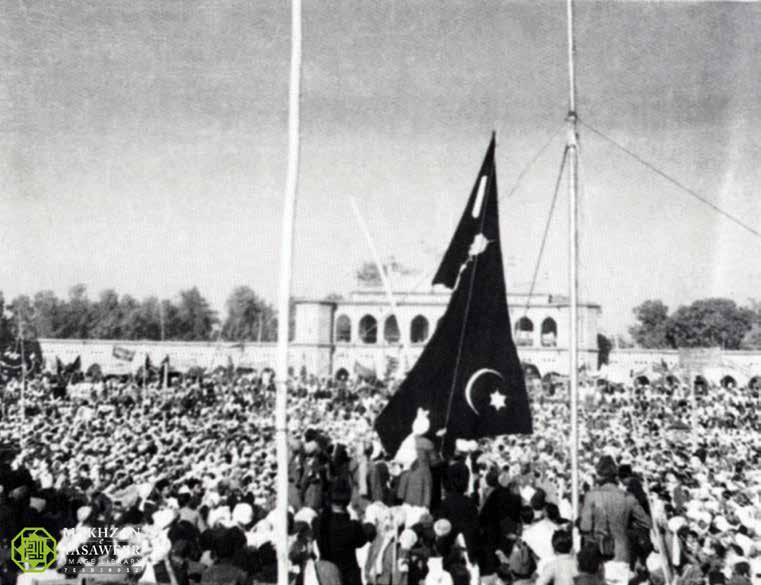
“When America presents its heart and soul to the Holy Prophet Muhammadsa, then will we consider that America has accepted Islam. [...] The day America constructs hundreds of thousands of mosques; the day when hundreds of thousands call the adhan from the minarets; the day when imams numbering hundreds of thousands lead the five daily prayers in mosques, will be the day when we consider that America has progressed.”
Huzoorra further said:
“Therefore, I advise the youth that these are the days for you to make efforts. Europe and America are seeking missionaries for the propagation of Islam. Today, America alone is seeking 200 missionaries, but tomorrow they will not seek 200, rather they will require 2,000 missionaries. The day after, they will not ask for 2,000, but they will ask for 200,000 missionaries. The day after that, they will not ask for 200,000 missionaries; rather they will ask for 20 million missionaries and the preparation of 20 million missionaries will require 200 years.” (Khutbat-e-Mahmud, Vol. 37, pp. 2428)
May Allah the Almighty enable all of us to spread the message of Islam Ahmadiyyat to all corners of the world. Amin
19AL HAKAM | Friday 7 October 2022
لضف نم اوغتباو ضرالا یف اورشتناف ۃولصلا تیضق اذاف ہللا
ضرالا ىف اورشتناف
نم اوغتباو هللا لضف
100 Years
‘Soul spoke to soul’: Australian Ahmadi convert Charles F. Sievwright (Muhammad A Haqq) on meeting Hazrat Mirza Ghulam Ahmad
published, would fill a great volume. And amongst which much could also be related in regard to my personal visit and sojourn, whilst in the North West Provinces, at Qadian in the Punjab – and how I met the Ahmadis and conferred with the Promised Messiah Ahmad (the peace and blessings of God be upon Him for all he suffered for Islam’s sake; as every Christ must also suffer who lays down his life for his friends).
I saw him in his yellow garments as was prophetically foretold he should wear indicating sickness […] – notwithstanding all that his loving Disciples did to alleviate it.
What my feelings were towards the Good Man beforehand when I was warned against him during my journey through the Far East (either to Doubters or Suspicioners) were removed entirely at Qadian. Spirit perception of the clear fulfilment of the prophecies of the Promised One gave me certain proof of their Divine origin.
This meeting with Ghulam Ahmad[as] in Qadian in the year 1903 was a wonderful proof of the truths of Islam, that words which had been uttered thirteen hundred years ago were then being fulfilled. But space and other subject matters do not permit me to here refer to them more extensively.
Muhammad Abdul Haqq (Charles F. Sievwright 1862-1933)
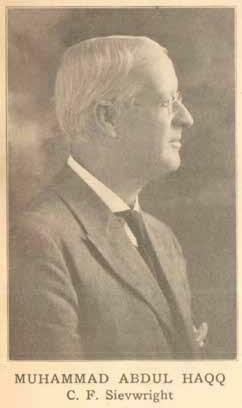
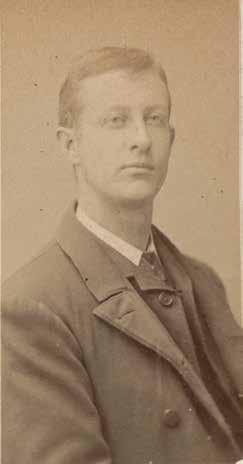
In The Review of Religions published at Qadian, India, in the issue of April 1906, No. 4 of Vol. 5, there appeared a contribution from my pen, telling the story of my experiences and belief after 10 years in Islam. I explained how, in my 34th year of age, on 23 March 1896, I was led to investigate the Islamic Philosophy, which became the means of converting me from Orthodox Christianity to the natural religion of which the Holy Prophet Muhammad[sa] was the Founder.
I may here inform the readers of the present day “Moslem Sunrise” as I did those others to whom I addressed my statement in 1906, similarly; “That I am not a Muhammadan in a racial sense but am a true believer of Muhammad’s religion.”
When I visited India in 1903 as the accredited Representative or Commissioner of the British and Indian Empire League of Australia, to present a petition to the Indian National Congress at its annual Conference at Madras held in December of that year, my mission was also for the purpose of completing my Muhammadan education by means of a tour through Islamic countries en route to Madras, as well as to explain the cruel operations of “The White Australia policy” and the restrictions of the Alien Immigration Act that had been created as constitutional law by the Commonwealth Government of that country.
To tell you of the result of that historical journey on my part to India would be impossible in these columns, for the incidents of that wonderful mission, if
My visit was locally or only decided upon whilst I was lecturing at the Town Hall Lahore on the question “Are the Indian Peoples British Subjects?”
On 22 October 1903, I was at Qadian and received the hospitality of the entire community, to most of whose dwellers I was the first white man that had ever visited their holy village as a guest. Nothing astonished me more, among all the extraordinary incidents during my missionary travels, than the finding of myself in that sacred place and face to face with its Messiah.
Eventually, when I was presented to him and eyes looked into eyes. He knew me to be Abdul Haqq (The Slave of Truth) and I knew him to be the Divinely appointed one to call the true believers (the faithful) to gather again to make the world safe for Islam. The Muslim confidences that followed betokened the love of God between us. Soul spoke to soul through spirit, after Allah had joined them by means of that miraculous meeting, the fore-ordained or predestined, as all events are arranged in Islam by the Almighty and One only true God (Allah-oAkbar).
Finally, after long months of deliberation and separation no wonder then that I made the declaration in The Review of Religions in April 1906 that “I have become a member of the Ahmadiyya Society of Qadian, so as to be associated with the most advanced sections of the Muslim Students of all the important religions of the world, as well as to be united in a very active Muhammadan Missionary Association for the spreading of Islamic knowledge.”
This was written from far away (New Zealand). I meant every word I wrote in the
above paragraph and have been true to my statements, ever since I said “Good Bye” to the Master at Qadian now over 19 years ago. Thus, did I again manifest the principle “I must cooperate before God can operate.”
After the advent in America of Mufti Muhammad Sadiq, I have further fulfilled my pledge to associate with the Ahmadiyya Movement in Islam, and have been active in assisting its first missioner, for many months past, to gain a footing in these dis-United States. To every Muslim or true believer who may read this article today, I give a Call in the name of Allah and by the love of the Holy Prophet Muhammad[sa], to answer my appeal, which is concisely given
in the following words:
“We must cooperate before God can operate!”
To every Christian or free thinker, or adherent of any other sectarian body I give a challenge to also enter into this cooperation with Islam. For each and all of us can repeat with all our heart and soul the memorable words uttered by the Promised Messiah[as] in 1902, and give assent thereto, “There is an indescribable bliss which one enjoys in the sight as well as in the word of God, who is the author of all existence and the cause of all causes. His word transports a man into a paradise of bliss in exactly the same manner as His sight does. It has not a single point of resemblance with the lifeless voices which proceed from satanic suggestions or delusions. It is an animation; it has a power; it has a magnetism; it has the characteristic of producing a certainty; it has a bliss; it has a light, and it has a supernatural glory. It is impossible that receptacle (yourself) of such revelation should ever have any misgiving as to its divine origin. To him a doubt is as fatal as unbelief.” (Wonderful words of life).
Such a revelation to an atheist is with him the greatest of miracles even if God would work no other miracle to make an atheist a believer. So, I regard it. A little philosophy inclines a man’s mind to atheism; but depth in philosophy bringeth men’s minds back to a religion of truth like Islam is!
Those who have been through it know that atheism is rather in the lip than in the head or heart of man, even as Bob Ingersoll, Tom Paine, Voltaire and others, alone, knew full well. They that denied God destroyed man’s nobility, for atheism in all respects is hateful.
But man, when he resists not evil and assures himself of Divine protection and favor, gathers a force and faith which human nature in itself could not obtain.
Thus, in these sayings will you clearly understand my appeal: “We must cooperate before God can operate.” We can if we believe we can.
(Transcribed and edited by Al Hakam from the original in The Moslem Sunrise, October 1922)
International Peace Day event attended by Ahmadis in Malaysia
Pinang (PKAPP) organised a programme in relation to World Peace Day, themed “End racism and build peace”.
The International Day of Peace or World Peace Day is observed around the world each year on 21 September. Established in 1981 by a unanimous United Nations resolution, Peace Day provides a globally shared date for all humanity to commit to peace above all differences and to contribute to building a “culture of peace”. Various events and seminars are also held to reassure we are fully committed to playing our part in building a peaceful world.
Peace Children Care Centre (PCCC) and Persatuan Kebajikan Asas Pulau
Tan Sri Dato Seri, Haji Mohd Yusof Latiff from Pengerusi Majlis Perundingan Muhibbah Negeri Pulau Pinang was the chief guest of this event. Jamaat-e-Ahmadiyya Penang, Malaysia was also invited to present the Islamic principles on the theme.
The jamaat had the privilege of presenting a brief, yet comprehensive introduction to Islam. Moreover, the noble teachings of the Holy Prophet Muhammadsa with regard to establishing peace were shared with the audience.
Friday 7 October 2022 | AL HAKAM20
Abdul Aziz Bin Mohammad Ibrahim Secretary Tabligh, Malaysia
The Moslem Sunrise, October 1922
Ago...
The Messiah’s re-advent: Understanding the significance of the ‘white minaret’ and ‘East of Damascus’

Jalees Ahmad Al Hakam
Among the many prophecies relating to the advent of the Promised Messiah, as found in the traditions of the Holy Prophet Muhammadsa, it is recorded:
‘‘Allah will send Jesus, son of Mary, and he will descend near the white minaret, east of Damascus.” (Sahih Muslim, Kitab al-Fitan wa Ashrat al-Sa‘ah, Hadith 2837)
It is unfortunate most Muslims claim Prophet Jesusas will physically descend to guide the Muslim Ummah – they have grossly misunderstood the ahadith about the Messiah’s arrival. A plethora of articles has already been penned on this matter.
A brief study of the above hadith is necessary to understand the profound wisdom the Holy Prophetsa conveyed.
We must understand three essential aspects of this hadith. Firstly, why the latterday Messiah was named ’Isa Ibn Maryam (this has been answered in issues 149 and 150 of Al Hakam)? Secondly, why did the Holy Prophetsa mention “Damascus”?
And thirdly, what is meant by “the white minaret”?
The meaning of ‘Nuzul’
One matter, must be resolved from the outset. Many Muslims imply this hadith strengthens the belief Prophet Jesusas would physically descend from heaven as the Holy Prophetsa has sued the Arabic yanzilu – “He will descend”.
As the meaning of nuzul has already been answered and clarified in an earlier article (Al Hakam, Issue 173), in light of this particular hadith, a brief answer shall suffice. The context of this hadith, in no way, denotes a physical descent from heaven. Heaven has not even been mentioned in this hadith. Hazrat Mirza Ghulam Ahmadas, the Promised Messiah has answered this on multiple occasions throughout his literature. He explained:
“The Arabic word nuzul [descent] is
commonly used to connote arrival. A person who arrives at one place from another is described as having descended to that place. For instance, it is said that an army or a camp has descended on such and such a place. This does not mean that the army or the camp has descended from heaven. The Holy Quran has also employed the expression nuzul [descent] for the Holy Prophet, peace and blessings of Allah be upon him.” (Izalae-Auham, Ruhani Khazain, Vol. 3, pp. 132133)
With the meaning of nuzul clear, let us move on to the essential points of this hadith.
Why did the Holy Prophetsa refer to ‘East of Damascus’
Before highlighting the wisdom behind why the Holy Prophetsa mentioned Damascus, I must first state the prophecy was revealed to the letter as Qadian is located to the East of Damascus. However, anyone who studies hadith and the words of the Holy Prophetsa would understand that no word of his is bereft of wisdom.
It is well known that the unholy doctrine of the trinity was first conceived in Damascus where Paul began to preach Prophet Jesusas as “God”. And so, the advent of the Promised Messiahas to the East of Damascus – the birthplace of the trinity – indicated he would illumine the world and rid it of this unholy doctrine and purify the world from it. This further alludes to the saying of the Holy Prophetsa that the Messiah would “break the cross”. The Promised Messiahas, in his book, Fountain of Christianity, writes:
“It is also worth noting that as long as Jesusas lived, Paul was his sworn enemy, and, according to Jewish chronicles, he only turned to Christianity after Jesus’ death because he had some selfish desires which the Jews did not fulfil. Therefore, to avenge himself, he became a Christian and pretended that Jesusas had appeared to him in a vision. He first sowed this unholy plant in Damascus, and this is the place where ‘Pauline Trinity’ was born. The Hadith in which it is said that the Messiah who
is to come will descend towards the East of Damascus alludes to the same thing. It means that the doctrine of the Trinity will come to an end with his coming, and people’s hearts will be inclined towards the Oneness of God. The appearance of the Messiah in the East signifies that he will become victorious, for when the light dawns it overcomes darkness.” (Fountain of Christianity, pp. 54-55)
What is meant by “the white minaret”
In the Arabic language, manarah signifies the time and the place of light. It is clear minarets are generally used to announce the Muslim call to prayer; a basic method and tool to make announcements.
There are some Muslims who, on taking the above-mentioned hadith literally, believe the Messiah would descend upon a physical minaret. However, as discussed above, the words and wisdom of the Holy Prophetsa are to be understood in full before making such assumptions.
The Promised Messiahas writes:
“The traditions prevalent among the Muslims which speak, for instance, of his descent near a minaret, are only meant to signify that his advent will be a glorious one and that he will be accompanied by Divine power.” (How To Be Free From Sin, p. 7)
In another place, the Promised Messiahas, writes:
“The word ‘minaret’ was chosen to indicate that the land of Damascus will be illuminated and brightened as a consequence of the supplications of the Promised Messiah after having been darkened by all sorts of innovations. You are also aware that the land of Damascus has been the source of the mischief of the Christians. (HamamatulBushra, Ruhani Khazain, Vol. 7, p. 225)
About the white minaret, the Promised Messiahas, explaining its significance, said it was a sign of the advent of the Promised Messiah, “his light [teachings] and call would soon reach the corners of the earth.” (Khutba Ilhamiyah, Ruhani Khazain, Vol. 16, p. 18)
Hazrat Khalifatul Masih IVrh, whilst commenting on this topic, said:
“The whiteness [of the minaret] is a symbol of powerful arguments and truth. So, he’ll come stationed on truth, and powerful, luminous arguments, and his message would reach far and wide. This would happen in the East of Dimashq [Damascus]. If you study, geographically, Qadian happens to be exactly to the East of Dimashq.” (Hazrat Mirza Tahir Ahmadrh, English Mulaqat, 11 May 1995)
And so, it is only after focusing on the essential points of the hadith and the words of the Holy Prophetsa that we can comprehend his wisdom and understand how this prophecy would be fulfilled. In a single sentence, the Holy Prophetsa conveyed to the Muslim Ummah, the future of Islam and how the Messiah would safeguard and revive its teachings.
Another point that must be addressed, albeit briefly, is if this hadith was not to be taken literally, then why was the Minaratul Masih in Qadian constructed on the appeal of the Promised Messiahas? The simple answer is, sometimes a material shape is given to matters of the metaphoric realm.
The Promised Messiahas has explained:
“It is also a Divine practise that He [Allah] uses physical illustrations to explain some spiritual matters. The Temple in Baitul Muqaddas [Jerusalem], and the Ka‘bah in Mecca, for example, serve as symbols of Divine manifestation. It is in this context that the Islamic Shariah speaks of the Promised Messiah’s descent on, or near a minaret, in a country which lies to the East of Damascus—just as Adam was given a dwelling in the East.” (How To Be Free From Sin, p. 7)
Alluding to this, Hazrat Khalifatul Masih IVrh, in relation to the People of the Cave, once said:
“In the case of Ashab-ul-Kahf, the People of the Cave […] it was discussed, ‘what would be the symbol for their great sacrifices?’. Now, that symbol was, although metaphoric, it was given a material shape of a minaret or a mosque. So, after the discussion, they said, ‘let’s build a mosque’. Now, there was no mosque before to indicate that that would be built on the mouth of the cave of the righteous people. But [a] mosque was built later on to indicate that it was here that God-fearing, believers in the unity of God, people who were persecuted and prosecuted on the surface of the Earth, who had to seek shelter in the caves – under the caves – when they came out, they came out here. […] A mosque became the symbol.” (Hazrat Mirza Tahir Ahmadrh, English Mulaqat, 11 May 1995)
21AL HAKAM | Friday 7 October 2022
ءاضيبلا ۃرانملا دنع لزنيف ميرم نبا حيسملا هللا ثعب ذإ قشمد يقرش
5th annual Ijtema of Majlis Atfal-ul-Ahmadiyya Ireland
Khilafat”.
On Saturday morning, the day began with congregational tahajjud and Fajr prayers followed by dars of the Holy Quran.
The Ijtema formally began with the opening session, chaired by Sadr Majlis Khuddam-ul-Ahmadiyya Ireland, Dr Rizwan Ahmad Sahib. During his welcoming address, Sadr sahib reminded atfal of the recent guidance of Hazrat Khalifatul Masih Vaa at the concluding session of MKA UK Ijtema 2022, about safeguarding one’s prayers, abstaining from falsehood and keeping good company. Some short clips were also played from Huzoor’s address.
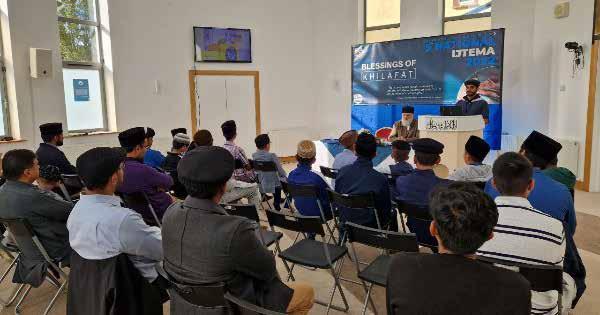
On Saturday evening, atfal enjoyed a special sitting with Sadr Majlis Khuddam-ulAhmadiyya, where they were able to interact and freely ask questions. A similar session was held the next day with Missionary-inCharge Ireland, Ibrahim Noonan Sahib in which atfal were able to ask him various questions, including about his journey from Christianity to Islam Ahmadiyyat.
A special exhibition was set up on “A Diamond of Khilafat: Syed Taalay Shaheed”. Guided tours were given to all three age groups, to instil in them the love and obedience to Khilafat which Syed Taalay Shaheed had displayed to a very high standard.
On Sunday, atfal were able to watch Huzoor’s live concluding address, delivered at the Lajna Imaillah UK Ijtema.
Atta-ur-Rahman Khalid Missionary, Ireland
After a break of two years, Majlis Atfal-ulAhmadiyya Ireland successfully held its 5th
annual Ijtema on 17 and 18 September 2022 at the Maryam Mosque in Galway.
Atfal travelled from all around the country to take part in the two-day event, which was on the theme, “Blessings of
Over the course of the two days, atfal participated in academic and sports competitions based on their age groups.
This year, Atfal also had a chance to enjoy indoor games at “The Hub” and a tuck shop was also set up for them.
The Ijtema concluded with the final session, chaired by the National President of Jamaat Ireland, Dr Muhammad Anwar Malik Sahib.
During the course of the Ijtema, it was apparent that the atfal were happy and enjoyed the various activities of the Ijtema.
Canadian Ahmadi Muslims invite neighbours to Mubarak Mosque, Brampton East to enlighten them about Islam
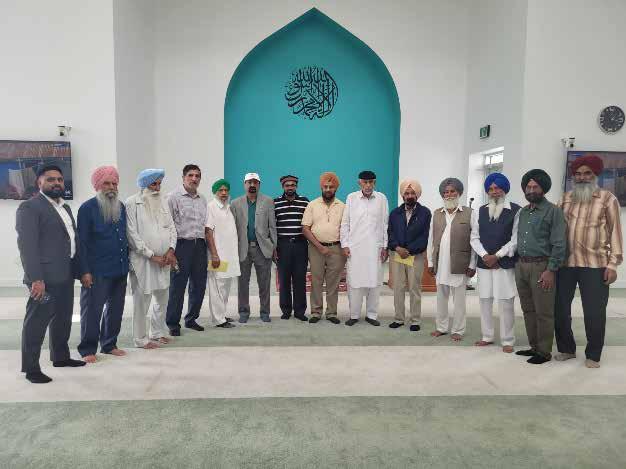 Syed Mukarram Nazeer Canada Correspondent
Syed Mukarram Nazeer Canada Correspondent
On Sunday, 11 September 2022, Jamaate-Ahmadiyya Brampton East held a local community barbecue event and invited people to visit the Mubarak Mosque located in the city of Brampton, reported the local Secretary Tabligh, Mirza Suleman Baig Sahib.
A team comprising of local missionaries and amila members visited six places of worship in Brampton and invited their representatives and community to the event.
Majlis Khuddam-ul-Ahmadiyya was given the task of distributing 1,400 flyers/door hangers in the immediate neighbourhood of the mosque. 37 Khuddam worked 61 hours and completed this task two days before the event. As a result of this, several neighbours visited the mosque, many of whom had never been to a mosque before.
44 volunteers carrying posters stood near various major intersections for a total of 64 hours, drawing the attention of drivers to the event. The banners and signs were placed on the periphery of the mosque property itself, announcing the event.
Upon arrival, the guests were welcomed and registered. Multiple faiths were represented, including Hinduism, Sikhism, Bahai, Islam and Christianity. Many guests shared their contact information for followup.
Once registered, the guests were provided with a guided tour of the Mubarak Mosque facility. This included the Mubarak Mosque itself, an exhibition and a bookstall. The exhibition presented a history of Islam and Ahmadiyyat, using video screens,
posters, flyers and displays. The bookstall was set up with close to 50 titles on display. These included the Holy Quran with translation into multiple languages, books of the Promised Messiahas, writings of Khulafa-e-Ahmadiyyat and scholars of the Jamaat. Several small booklets, pamphlets and copies of The Review of Religions were also on hand for free distribution.
Lajna Imaillah made arrangements for female guests. They set up an Islamic art exhibition. In addition, they set up a Hijab Booth, where guests could try out various Hijabs if they wanted to.
Gift bags containing introductory leaflets, commemorative pens, and copies of The Review of Religions were prepared and
gifted to dignitaries.
A barbecue was arranged for everyone on the grounds of the mosque. Food was served for almost the entire duration of the event. Approximately 300 people were served.
A total of 110 non-Ahmadi guests attended the event. Feedback from some of the guests is given below:
A group of four Iranians of the Bahai faith spent time in the mosque and visited the exhibition. They asked questions about Khilafat and women’s rights. They took some literature and said they were going to Iran and would take it with them.
A Christian from Afghanistan came from the neighbouring city of Mississauga.
He showed keen interest in the teachings of Islam Ahmadiyyat and asked many questions.
A neighbour next to the mosque came with his family. His mother said she saw the mosque daily from her window but never had the opportunity to visit it. She always wanted to see the mosque and today she had that chance. The family was happy to learn about Islam and said many misconceptions were removed during the event.
A Christian woman wanted to learn how daily prayers are offered and so she decided to wait and see how we observed salat She also asked many questions about wudu (ablution) and what is read during the salat
Another women guest came and was given a guided tour. At the ‘Hijab Booth’, she tried on a hijab and took some pictures while wearing it. She asked if she could keep a hijab and was provided one.
A person came to the mosque to distribute flyers about his local municipal election campaign. He was invited for lunch and given a guided tour. He was very happy to learn about Islam and Ahmadiyyat and when asked if he was not getting late in his flyer distribution, he replied that he was, but what he was learning about Islam that day was more interesting and important.
A group of Sikh guests attended and were given a guided tour of the facility and were informed that Jamaat-e-Ahmadiyya started in a small town in India. They were introduced to how the Jamaat is serving communities across the world. One guest was inspired by this and raised the slogan, Ahmadiyyat Zindabad!
Friday 7 October 2022 | AL HAKAM22
Friday Sermon
9 September 2022 Men of Excellence: Hazrat Abu Bakrra
After reciting the tashahud, ta‘awuz and Surah al-Fatihah, Hazrat Khalifatul Masih Vaa said:
I will mention some accounts relating to the life of Hazrat Abu Bakr Siddiqra
When the time of the demise of Hazrat Abu Bakrra drew near, he called for Hazrat Abdur Rahmanra bin Auf and said, “Tell me about Umarra.” Hazrat Abdur Rahmanra bin Auf replied, “O Caliph of the Messengersa of Allah! By God, Hazrat Umarra is even better than the opinion you hold about him, except for the fact that he is strict in his disposition.” Hazrat Abu Bakrra said, “He is strict as he sees leniency in me. However, if he was entrusted with the leadership, he would give up many of his habits. I have observed that when I treated someone in a strict manner, he would try to reconcile me with that individual and if I showed leniency to someone, he would ask me to be stricter.”
Following this, Hazrat Abu Bakrra called for Hazrat Usmanra bin Affan and asked him about Hazrat Umarra. Hazrat Usmanra said, “His inner state is even better than his outer state and there is none among us who is like him.” Upon this, Hazrat Abu Bakrra said to both of them, “Do not disclose to anyone else what I have just discussed with you!”
Following this, Hazrat Abu Bakrra said, “If I do not choose Hazrat Umarra, I will look no further than Usman and they will have the authority to govern your affairs in the best manner. It is my desire now to move away from governing your affairs and join those who have passed away from among you.”
During the days of Hazrat Abu Bakr’sra illness, Hazrat Talhara bin Ubaidillah approached him and said, “You have made Hazrat Umarra the Khalifah of the people, even though you can see how he treats people in your presence. What will be the situation when he is alone and you will meet your Lord and He will question you about your people?” As Hazrat Abu Bakrra was lying down, he asked to be sat up. When he was sat up and leaning against some support, he said, “Are you making me fearful of Allah? When I will meet my Lord and He will question me, I will say, ‘I appointed the best among Your servants as their Khalifah.’” (Ibn Athir, Al-Kamil fi al-Tarikh, Vol. 2 [Beirut, Lebanon: Dar alKutub al-‘Ilmiyyah, 2003], pp. 272-273.)
Referencing books of history, Hazrat Musleh-e-Maudra states the following in this regard, “When the time of the demise of Hazrat Abu Bakrra drew near, he sought counsel from the companions as to who to appoint as the Khalifah. Most companions
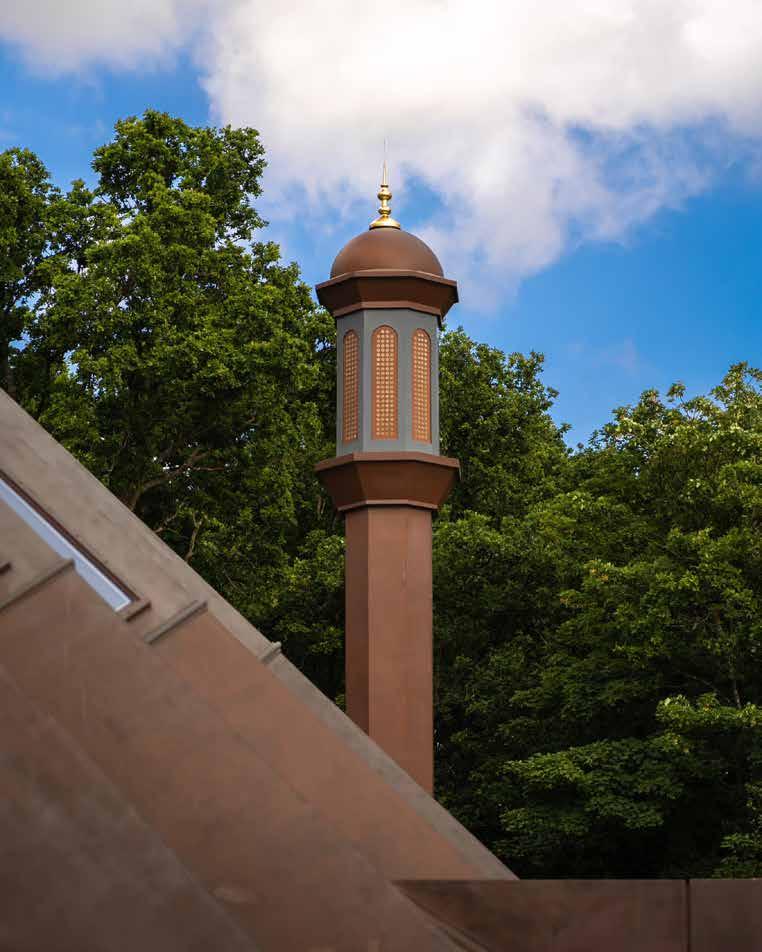
23AL HAKAM | Friday 7 October 2022
Photo courtesy of Suhaib Ahmad
expressed their opinion of appointing Hazrat Umarra as their leader. The only objection that some [companions] raised was the fact that he was rather strict in his disposition and that he might treat people in a strict manner. Hazrat Abu Bakrra said, ‘This strictness of his was limited to the time when he was not yet entrusted with a responsibility. However, now that a responsibility will be entrusted to him, his strictness will become balanced as well.’ Hence, all companions agreed on the Khilafat of Hazrat Umarra. As Hazrat Abu Bakr’sra health had deteriorated quite a lot, he took the support of his wife, Asma, and went to the mosque in a state in which his legs were unstable and his hands were shaking. Addressing all of the Muslims, he said, ‘For many days, I have continuously contemplated over this matter that if I pass away, who should be your Khalifah. In the end, after much contemplation and supplications in this regard, I deem it appropriate to appoint Umarra as your Khalifah. As such, Umarra will be your Khalifah after my demise.’ All of the companions and all the people agreed to this appointment and pledged initiation at the hands of Hazrat Umarra following the demise of Hazrat Abu Bakrra.” (Khilafat-eRashidah, Anwar-ul-Ulum, Vol. 15, pp. 484483)
Hazrat Musleh-e-Maudra further expounds on the matter whilst answering the allegation of why there was a nomination. He states, “If it is said that a Khalifah can only be appointed upon being elected by the people, then why did Hazrat Abu Bakrra nominate Hazrat Umarra? The answer is that he did not arbitrarily nominate him, rather it is proven that he first consulted with other Companions. If there is a difference, it is only that other Khulafa have been elected after the demise of the [previous] Khalifah, while Hazrat Umarra was chosen during the lifetime of Hazrat Abu Bakrra. However, he did not just stop there (Hazrat Abu Bakrra did not simply deem it to be enough to simply consult a few Companions and then announce Hazrat Umarra as the Khalifah), rather, despite his intense weakness, with the help of his wife, he went to the mosque and said to the people, ‘O people, after consulting the Companions, I have chosen Umar to be the Khalifah after me. Do you accept his Khilafat?’ Upon this, everyone expressed their approval. Hence, this too was a form of election.” (Khilafat-e-Rashidah, Anwar-ulUlum, Vol. 15, p. 555)
Hazrat Abu Bakr’sra illness and his will are further detailed in Tarikh al-Tabari It is recorded that the cause of Hazrat Abu Bakr’sra illness was that on Monday 7 Jamadiul Awwal, he performed ablution and it was very cold on that particular day. Due to this, he developed a fever which lasted for fifteen days. It was so severe that he was unable to attend the prayers. He instructed Hazrat Umarra to lead the prayers. People would come to visit him, however, his condition deteriorated day by day. At the time, Hazrat Abu Bakrra was residing in the home which had been granted to him by the Holy Prophetsa which was situated right in front of Hazrat Usmanra bin Affan’s home. During his illness, it was Hazrat Usmanra who tended to him the most. (Muhammad Ibn Jarir al-Tabari, Tarikh al-Tabari, Vol. 2 [Beirut, Lebanon: Dar al-Kutub al‘Ilmiyyah, 2012], p. 348.)
He remained ill for fifteen days. Someone
suggested to him that it would be beneficial for him to call a physician. He replied, “He has already seen me.” People asked him what the physician had said, to which he replied:
“I do as I please.” (Muhammad Ibn Jarir al-Tabari, Tarikh al-Tabari, Vol. 2 [Beirut, Lebanon: Dar al-Kutub al-‘Ilmiyyah, 2012], p. 347.)
It is stated in another narration that when Hazrat Abu Bakrra fell ill, people asked if they should call a physician for him, to which Hazrat Abu Bakrra said, “He has already seen me and said:
“I will surely do whatever I please.” (Ibn Sa’d, Al-Tabaqat al-Kubra, Vol. 3 [Beirut, Lebanon: Dar al-Kutub al-‘Ilmiyyah, 2012], p. 148.)
He meant that it was Allah the Almighty’s will to summon him and thus there was no need to call a physician. On Tuesday, 22 Jamadiul Akhir 13 AH, Hazrat Abu Bakrra passed away at the age of 63. His era of Khilafat spanned two years, three months and ten days. (Ibn Sa’d, Al-Tabaqat al-Kubra, Vol. 3 [Beirut, Lebanon: Dar al-Kutub al‘Ilmiyyah, 2012], p. 151.)
The very last words spoken by Hazrat Abu Bakrra were the words of the blessed verse of the Holy Quran:
“Let death come to me in a state of submission to Thy will and join me to the righteous.” [12:102] (Muhammad Husain Haikal, Abu Bakr Al-Siddiq, Islami Kutub Khana, Lahore, p. 478)
The words imprinted on the ring of Hazrat
Bakrra
“How Great is Allah Who is allPowerful.” (Ibn Sa’d, Al-Tabaqat al-Kubra, Vol. 3 [Beirut, Lebanon: Dar al-Kutub al‘Ilmiyyah, 1990], p. 157.)
Hazrat Aishara relates that Hazrat Abu Bakrra had stated that after preparing his coffin and funeral, they should see to it whether anything else remained to be done. All the affairs had been entrusted to Hazrat Umarra, but in case there was anything left. And if there was something, then that should also be entrusted to Hazrat Umarra With regards to preparing his coffin and burial, he stated, “the cloth which I have on me should be washed and used along with the other clothes in which you wrap my body.” Hazrat Aishara submitted, “This cloth is old and there should be a new piece of cloth to wrap the body.” Upon this, Hazrat Abu Bakrra stated, “Those who are alive have a greater right to wear new clothes than those who have passed away.” (Siyar al-Sahabah, Vol. 1 [Karachi, Pakistan: Dar al-Isha’ah], p. 50.)
He stated that it would be better if the new cloth was given to someone who was alive.
Hazrat Aishara narrates that Hazrat Abu Bakrra had stated as part of his will that his wife, Hazrat Asma bint Umais would wash his body. Hazrat Abu Bakr’sra son, Hazrat Abdur Rahmanra assisted his mother in this task. His body was shrouded in two cloths, one of which was used to wash his body. It is also narrated that his body was shrouded in three pieces of cloth. Thereafter, his body
was placed on the bed of the Holy Prophetsa This was the same bed that Hazrat Aishara would sleep upon and his body was taken from this same bed for his funeral. Hazrat Umarra led the funeral prayer of Hazrat Abu Bakrra between the grave of the Holy Prophetsa and his pulpit and he was buried beside the Holy Prophetsa in the night in the same enclosure. Hazrat Abu Bakr’sra head was placed in line with the Holy Prophet’ssa shoulders. (Mustadrak Hakim, Vol. 3, Dar al-Kutub al-‘Ilmiyyah, Beirut, 2002, Hadith no. 4409, p. 66)
At the time of the burial, Hazrat Umarra bin Al-Khattab, Hazrat Usmanra bin Affan, Hazrat Talhara bin Ubaidullah and Hazrat Abdur Rahmanra bin Abi Bakr came down into the grave and did the burial. Ibn Shihab narrates that Hazrat Umarra buried Hazrat Abu Bakrra at night. (Ibn Sa’d, Al-Tabaqat al-Kubra, Vol. 3 [Beirut, Lebanon: Dar alKutub al-‘Ilmiyyah, 1990], p. 154.)
Hazrat Salimra bin Abdillah relates from his father that Hazrat Abu Bakr’sra demise occurred due to his sorrow over the demise of the Holy Prophetsa. This is because, after the demise of the Holy Prophetsa, Hazrat Abu Bakr’sra body continuously weakened until he passed away. (Mustadrak Hakim, Vol. 3, Dar al-Kutub al-‘Ilmiyyah, Beirut, 2002, Hadith no. 4410, p. 66)
Some historians have also reported that the cause of Hazrat Abu Bakr’sra demise was due to eating food that a Jewish person had poisoned. However, most historians have rejected this narration. (Umar Abu Al-Nasr, Sirat Syedna Siddiq-e-Akbar, Mushtaq Book Corner, Lahore, p. 726)
Hazrat Aishara narrates that as the time of his demise drew close, Hazrat Abu Bakrra enquired what day it was. People informed him that it was a Monday. Upon this, Hazrat Abu Bakrra stated, “If I pass away today, then do not wait till tomorrow because that day and that night is dearer to me, which is closest to the Holy Prophetsa.” (Ahmad bin Hanbal, Musnad Ahmad bin Hanbal, Vol. 1, Musnad Abi Bakr Al-Siddiq, Hadith: 45, [Beirut, Lebanon: ‘Alam al-Kutub, 1998], p. 88.)
In other words, he wanted to be buried on that same day.
Hazrat Abu Bakrra stated, “After my demise, my inheritance should be distributed according to the Quranic injunctions.” (Muhammad Ilyas Adil, Sirat Khulaf-e-Rashideen, Mushtaq Book Corner, Lahore, p. 152)
Likewise, according to another narration he assigned a fifth of his wealth in his will to his relatives who were not heirs to it. (Muhammad Husain Haikal, Abu Bakr AlSiddiq, Islami Kutub Khana, Lahore, p. 475)
In relation to the wives and children of Hazrat Abu Bakrra it is recorded that he had four wives. The first was Qutailah bint Abd al-Uzzah. There are differing views with regard to her acceptance of Islam. She was the mother of Hazrat Abdullahra and Hazrat Asmara. Hazrat Abu Bakrra divorced her in the era of ignorance. She once went to Hazrat Asma’sra house in Medina, i.e. her daughter, with gifts of clarified butter and cheese. However, Hazrat Asmara refused the gifts, and wouldn’t let her enter her home. She called for Hazrat Aishara to ask the Holy Prophetra in this regard. She then asked Hazrat Aishara what the verdict of the Holy Prophetsa was after her mother came in that manner bringing gifts and after she refused
to let her in. Upon this, the Holy Prophetsa instructed her to let her enter her home and to also accept her gifts.
His second wife was Hazrat Umm-eRumanra bint Amir. She belonged to the Banu Kinanah bin Khuzaimah. Her previous husband Harith bin Sakhbarah passed away in Mecca. Thereafter, her marriage took place with Hazrat Abu Bakrra. She entered the fold of Islam in the early period, pledged her allegiance to the Holy Prophetsa, and also migrated to Medina. Hazrat Abdur Rahmanra and Hazrat Aishara were born to her. She passed away in 6 AH in Medina. [Upon her demise,] the Holy Prophetsa came down into her grave and prayed for her forgiveness.
His third wife was Hazrat Asmara bint Umais bin Ma’bad bin Harith. Her title was Umm Abdillah. She had accepted Islam and pledged allegiance to the Holy Prophetsa even before entering Dar-e-Arqam. She participated in the first migration. She first migrated alongside her previous husband, Hazrat Ja’farra bin Abi Talib, to Abyssinia, and from there she migrated to Medina in 7 AH. After her husband was martyred in 8 AH during the Battle of Mu’tah, she married Hazrat Abu Bakrra. She gave birth to Muhammad bin Abi Bakr.
His fourth wife was Hazrat Habibah bint Kharijah bin Zaid bin Abi Zuhair. She belonged to the Khazraj branch of the Ansar. Hazrat Abu Bakrra would stay with her in the neighbouring area of Medina called Sun’a. She gave birth to Hazrat Abu Bakr’sra daughter, Umm-e-Kulthum, who was born a short while after his demise.
He had four sons and three daughters. His first son was Hazrat Abdur Rahmanra bin Abi Bakr. He was the eldest son of Hazrat Abu Bakrra. He accepted Islam during the treaty of Hudaibiyah and remained firmly attached to Islam. He had the honour of being in the presence of the Holy Prophetsa He was renowned for his bravery and courage. After accepting Islam, he was greatly praised for his character.
His second son was Hazrat Abdullahra bin Abi Bakr. He played an important role in the migration of the Holy Prophetsa to Medina. He would spend the entire day in Mecca, gathering information from the Meccans, and then at night he would secretly go to the cave and relay that information to the Holy Prophetsa and Hazrat Abu Bakrra, and then return in the morning to Mecca. He was hit by an arrow during the battle in Ta’if, and the wound sustained from this did not heal. Eventually, as a result of this, he attained martyrdom during the era of Hazrat Abu Bakr’sra Khilafat.
His third son was Muhammad bin Abi Bakr. He was born to Hazrat Asmara bint Umais. He was born in Dhu al-Hulaifah on the occasion of Hajjat al-Wida [farewell pilgrimage]. He was raised by Hazrat Alira, and during the era of Hazrat Ali’sra Khilafat, he appointed him as the governor of Egypt. That is where he was killed. According to some narrations, his name has been mentioned among those who killed Hazrat Usmanra, and this is why he was killed. Allah knows best.
His fourth child was Hazrat Asmara bint Abi Bakr. She was known by her title of Dhat al-Nataqain [the one with two waist belts]. She was older than Hazrat Aishara The Holy Prophetsa gave her the title of Dhat al-Nataqain because during the migration
Friday 7 October 2022 | AL HAKAM24
ءاشا ام لعفا ىنا
ديرأ امل لاعف ينإ
نیحلصلاب ینقحلاو املسم ینفوت
Abu
were: هللا رداقلا معن
she prepared a food container for the Holy Prophetsa and her father, but seeing as she had nothing to tie it with, she tore her waist belt and used that to tie the container. Hence, the way in which she prepared this food was by tying the container with the cloth from her waist belt. She was married to Hazrat Zubairra bin al-Awwam and she migrated to Medina whilst pregnant. After completing the migration, she gave birth to Hazrat Abdullahra bin Zubair, who was the first child born after the migration. Hazrat Asmara reached the age of 100 and passed away in Mecca in 73 AH.
The fifth child was the Mother of Believers, Hazrat Aishara bint Abu Bakr. She was the wife of the Holy Prophetsa. She was the greatest scholar among women. The Holy Prophetsa gave her the title of Umm Abdullah [Mother of Abdullah]. The Holy Prophetsa had exemplary love for her. Imam Sha’birh says that whenever Masruq related a narration from Hazrat Aishara, he would say, “I was told by Sadiqah bint Siddiq, who is the beloved of Allah’s beloved and whose exoneration was revealed by Allah.” She passed away at the age of 63 in 57 AH. According to another narration, she passed away in 58 AH. The sixth child was Umm Kulthoom bint Abu Bakr. She was born to Hazrat Habibah bint Kharijah. At the time of his demise, Hazrat Abu Bakrra said to Hazrat Aishara, “You have two brothers and two sisters.” Hazrat Aishara said, “I know of my sister Asma’, but who is my second sister?” Hazrat Abu Bakrra said, “She who is in Kharijah’s womb” In other words, she was yet to be born, and the child would be a girl. He said, “I am convinced that she will have a daughter.” And that is exactly what happened. Umm Kulthoom was born after the demise of Hazrat Abu Bakrra. Umm Kulthoom was married to Hazrat Talha bin Ubaidullah who was martyred in Jang-eJamal. (Muhammad al-Salabi, Sayyiduna Abu Bakr Siddiqra Shakhsiyyat aur Karname [Khan Garh, Pakistan: Al-Furqan Trust], pp. 48-52.), (Ibn Kathir, Al-Bidayah wa al-Nihayah, Vol. 8, [Beirut, Lebanon: Dar al-Kutub al-‘Ilmiyyah, 2001] pp. 87 and 99.), (Usd al-Ghabah fi Ma’rifat al-Sahabah, Vol. 5, [Beirut, Lebanon: Dar al-Kutub al‘Ilmiyyah], 97.), (Asaabah, Vol. 8, [Beirut: Dar al-Kutub al-‘Ilmiyyah, p. 392)
According to some narrations, one of Hazrat Abu Bakr’sra daughters was married to Hazrat Bilal and it is also stated that this daughter was from one of his four wives’ previous husband. (Umar Abu Al-Nasr, Sirat Syedna Siddiq-e-Akbar, Mushtaq Book Corner, Lahore, p. 647)
Regarding the system of government, it is recorded that whenever a matter came before Hazrat Abu Bakrra, the manner in which he governed was that if a matter needed to be deliberated upon, then he would consult with people who gave sound advice and if he needed advice from people with jurisprudential knowledge, he would consult with both the Muhajireen and the Ansar and would also call Hazrat Umarra, Hazrat Usmanra, Hazrat Alira, Hazrat Abdur Rahmanra bin Auf, Hazrat Mu’adhra bin Jabal, Hazrat Ubayyra bin Ka’ab, and Hazrat Ziadra bin Thabit. (Ibn Sa’d, Al-Tabaqat alKubra, Vol. 2 [Beirut, Lebanon: Dar alKutub al-‘Ilmiyyah, 2012], p. 267.)
At other times, he would call the Muhajireen and Ansar in greater numbers. Hazrat Musleh-e-Maudra states in the
[“Consult them” (3:160)]:
“Ponder over this word; it is apparent that there is a single person seeking consultation, not even two, and the people being consulted are three or more. Then that person should ponder over the advice received and thereafter is the commandment,
[“And when thou art determined then put thy trust in Allah” (3:160)]
When one is convinced of something, then they should act upon it without any care for what anyone else says.” In other words, the person seeking consultation should take the advice, analyse all aspects and then should act upon it without caring about what anyone else has to say. He further writes, “We find great examples of this determination in the era of Hazrat Abu Bakrra. When people started becoming apostates, it was suggested that he [Hazrat Abu Bakrra] should hold back the army that was about to be sent under the command of Usamara, however, he responded, ‘This army was commissioned by the Holy Prophetsa, hence I cannot hold it back. The son of Abu Quhafah does not have the power to do so.’ He did hold back some people, such as Hazrat Umarra who was about to depart along with the army.
Then, it was said regarding Zakat that in order to avoid people becoming apostates, it should be remitted. Hazrat Abu Bakrra replied, ‘Had they given the Holy Prophetsa so much as the rope used to tie a camel, I will ensure to take even that. Even if you all leave me and the wild beasts in the jungle join the apostates, then I will fight them all on my own.’ This was an example of determination, and you know what transpired thereafter.
(This was the determination of Hazrat Abu
Bakrra. Even though people had suggested differently, what happened after that?) As a result of this exemplary determination, Allah the Almighty opened the door to victories. Remember, when a person fears God, others cannot overawe them.” (Mansab-e-Khilafat, Anwar-ul-Ulum, Vol. 2, p. 58)
This is the reality of the institution of Khilafat.
Establishment of the treasury; during the blessed era of the Holy Prophetsa, he would distribute any wealth received from spoils, Khums, Fai, Zakat etc. immediately in the presence of everyone at the mosque. In this way, it can be said that the department of the treasury existed during the time of the Holy Prophetsa. However, during the era of Hazrat Abu Bakrra, the various conquests meant that along with income under various heads, there was an increased influx of spoils and Jizyah. Hazrat Abu Bakrra felt the need to establish a treasury where the wealth could be stored until it was distributed or spent. Hence, after consulting with senior Companions, he dedicated a home for this purpose. However, this was ultimately a treasure only in name, as Hazrat Abu Bakrra always strove to immediately distribute any wealth that was brought in. According to some narrations, the responsibilities of the department of the treasury were entrusted to Hazrat Abu Ubaidahra. (Bashir Sajid, Ashra Mubashra, [Lahore: Al-Badr Publications, 2000], p. 181)
Initially, Hazrat Abu Bakrra established the treasury in the valley of Sun’a, however, there was no guardian appointed over it. Sun’a is located in the environs of Medina, about two miles from the Prophet’ssa Mosque. Once, someone asked him why he hadn’t appointed anyone to guard the treasury. He replied, “A lock is enough for its protection (in other words, it was enough for there to be a lock) because he would distribute anything that went into
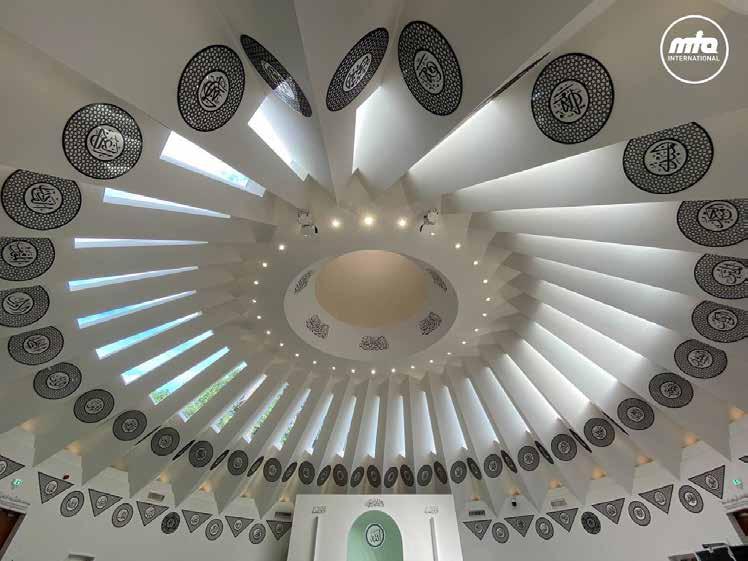
the treasury and it was often empty to the point that there would be nothing left. Then when he moved to Medina, he moved the treasury to his own home. His practise was that any wealth that went into the treasury would be distributed to the point that it became empty. He would give an equal share to everyone when he distributed the wealth and it was from the same wealth that he would also purchase camels, horses and weaponry and distribute it in Allah’s way. Once, he bought some sheets from the Bedouins and distributed them among the widows in Medina.” (Allamah Al-Suyuti, Tarikh Al-Khulafa, [Beirut: Dar-ul-Kitab Al-Arabi, 1999], pp. 63-64), (Furhang-eSirat, [Karachi: Zawar Academy], p. 157)
He must have done this on multiple occasions, however, this has been recorded once in the narrations.
A stipend from the treasury was stipulated for Hazrat Abu Bakrra. Regarding this, it is recorded that when Hazrat Abu Bakrra was elected as the Khalifah, a stipend was fixed for him from the treasury in order to fulfil his needs. Hazrat Aishara relates, “When Hazrat Abu Bakr Siddiqra became the Khalifah, he said, ‘My people know that my occupation did not hinder me from providing sustenance for my family. I had enough income to run my household with ease. However, now I have become occupied with tending to the matters of the Muslims. So now, Abu Bakr’s family will be provided for from the treasury and he (as in Abu Bakr) will take this wealth and work for the Muslims and increase it through trade.’” (Sahih Al-Bukhari, Kitab-ul-Buyu’, Hadith no. 2070)
Hence, the Muslims stipulated for him an annual amount of six thousand dirhams. Some say that he only approved as much as he needed. He was the first Wali, or leader of government, whose expenditures were approved by his people.
(Ibn Athir, Al-Kamil
25AL HAKAM | Friday 7 October 2022
commentary
of رمالا یف مھرواش
ہللا یلع لکوتف تمزع اذاف
fi al-Tarikh, Vol. 2 [Beirut, Lebanon: Dar alKutub al-‘Ilmiyyah, 2006], p. 272.)
According to one narration, it is mentioned that when Hazrat Abu Bakrra became the Khalifah, one day in the morning, he set out towards the market. He was carrying on his shoulders the garments he used in his business. [On the way,] he met Hazrat Umarra bin Al-Khattab and Hazrat Abu Ubaidahra bin Al-Jarrah. They said, “O Khalifah of the Messengersa, where are you going?” He replied, “to the market.” They said, “Why are you doing this when you are the leader of the Muslims?” He said, “How will I feed my family?” They took him alongside them, saying that they would assign a portion for him. (Ibn Sa’d, AlTabaqat al-Kubra, Vol. 3 [Beirut, Lebanon: Dar al-Kutub al-‘Ilmiyyah, 2012], p. 137.)
Hence, an annual stipend of three thousand dirhams was established. According to other narrations, the stipend was six thousand dirhams, as mentioned earlier. According to some, he was given a total of six thousand dirhams over the course of his Khilafat. Similarly, according to the books of history, it is almost unanimously recorded that although Hazrat Abu Bakrra received a stipend from the treasury in order to fulfil his needs and those of his family, however, he returned all the amount before his demise. Hence, it is stated in one narration that as his demise drew near, he made a will for his land to be sold and for the amount to be used in order to pay the treasury back for the amount he had used in personal expenses. (Ibn Athir, Al-Kamil fi al-Tarikh, Vol. 2 [Beirut, Lebanon: Dar al-Kutub al-‘Ilmiyyah, 2006], p. 272.), (Ibn
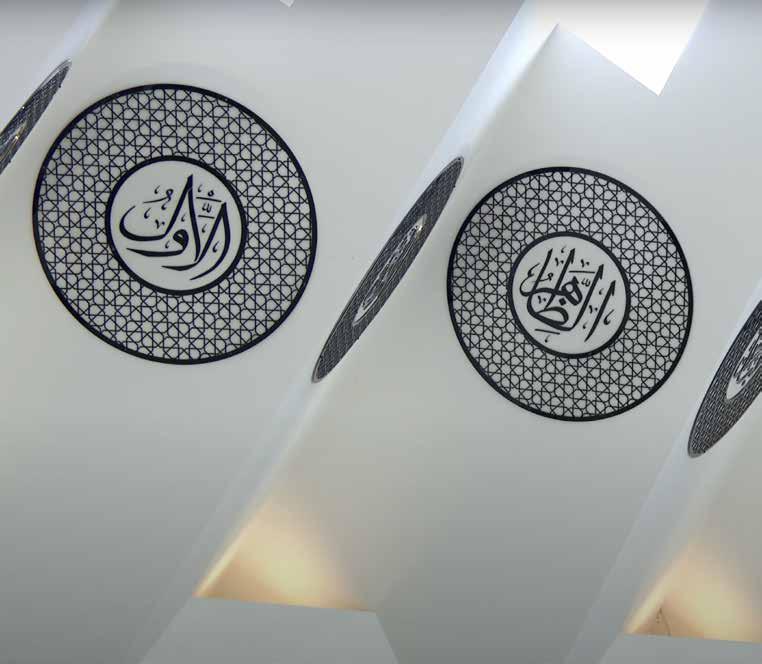
Sa’d, Al-Tabaqat al-Kubra, Vol. 3 [Beirut, Lebanon: Dar al-Kutub al-‘Ilmiyyah, 1990], p. 143.)
It is recorded in another narration that when Hazrat Abu Bakr’sra demise was drawing near, he said to Hazrat Aishara, “Since I became the Khalifah, I have not used a single dinar or dirham belonging to the nation. I would eat a little and wear thick clothes. Furthermore, the following are considered spoils for Muslims; servants, camels and fabric. Hence, after my passing, all of these things should be sent to Umar.” Hazrat Aishara states, “When he passed away, I sent those things to Hazrat Umarra Upon seeing them, he began to cry to the extent that his tears fell to the ground as he said, ‘may Allah have mercy on Abu Bakr, he has placed those after him in difficulty.’” (Ibn Athir, Al-Kamil fi al-Tarikh, Vol. 2 [Beirut, Lebanon: Dar al-Kutub al-‘Ilmiyyah, 2006], p. 271.),
When Hazrat Abu Bakrra passed away, Hazrat Umarra called a few Companions to take stock of the treasury, only to find that there was nothing there. (Allamah AlSuyuti, Tarikh Al-Khulafa, [Beirut: Dar-ulKitab Al-Arabi, 1999], p. 64),
It was empty, as everything had been distributed.
Hazrat Abu Bakrra also established the department of arbitration. Although the department of arbitration had not taken systematic form during the era of Hazrat Abu Bakrra, however, he had assigned the duties of this department to Hazrat Umarra (Umar Abu Al-Nasr, Sirat Syedna Siddiq-eAkbar, Mushtaq Book Corner, Lahore, p. 699)
It is mentioned in one narration that when Hazrat Abu Bakrra became the Khalifah, Hazrat Umarra said, “I will serve in the courts on your behalf.” Hazrat Umarra waited for one year, however, no two people came to him with a dispute. (Muhammad Ibn Jarir al-Tabari, Tarikh al-Tabari, Vol. 2 [Beirut, Lebanon: Dar al-Kutub al‘Ilmiyyah, 2012], p. 351.)
No quarrels, disputes or issues would arise and so the number of cases was very low. If there ever was a case, Hazrat Abu Bakrra would take time out for it himself in order to resolve the matter. Hazrat Umarra was the head of the department of arbitration, and the following Companions had been assigned to help him: Hazrat Alira, Hazrat Mu’adhra bin Jabal, Hazrat Ubayyra bin Ka’ab, Hazrat Zaidra bin Thabit and Hazrat Abdullahra bin Mas’ud. (Umar Abu Al-Nasr, Sirat Syedna Siddiq-eAkbar, Mushtaq Book Corner, Lahore, pp. 699-700)
Hazrat Umarra relates, “There was such a state of peace, security and honesty at the time, that months would pass by and no two people would come to me in order to resolve a matter.” (Ibn Sa’d, Al-Tabaqat al-Kubra, Vol. 3 [Beirut, Lebanon: Dar al-Kutub al‘Ilmiyyah, 2012], p. 137.)
Regarding the department of jurisprudence, it is recorded that as new tribes and dwellings entered into the fold of Islam and in light of the circumstances, various jurisprudential matters were arising, Hazrat Abu Bakrra established the department of jurisprudence for the ease and guidance of the general Muslim population. He appointed Hazrat Umarra,
Hazrat Usmanra, Hazrat Alira, Hazrat Abdur Rahmanra bin Auf, Hazrat Ubayyra bin Ka’ab, Hazrat Mua’dhra bin Jabal and Hazrat Zaidra bin Thabit to issue edicts, because they were all distinct from others in their deep understanding, knowledge and interpretation of the faith. According to one narration, Hazrat Abdullahra bin Mas’ud was also among the Companions approved to issue edicts. No one else had permission to issue edicts except for them. (Bashir Sajid, Ashra Mubashra, [Lahore: Al-Badr Publications, 2000], p. 182), (Umar Abu AlNasr, Sirat Syedna Siddiq-e-Akbar, Mushtaq Book Corner, Lahore, p. 700)
One historian writes regarding the department of inscription, “In modern terminology, a scribe can be likened to a secretary in government,” such as secretaries who take notes in meetings and relay them. During Hazrat Abu Bakr’sra Khilafat, although a system of administration had not yet been established, however, there were certain people assigned to write down executive orders, treaties and other things that required to be written down. Hazrat Abdullahra bin Arqam had been assigned the duty of inscription from the time of the Holy Prophetsa and he was also entrusted with this duty during the era of Hazrat Abu Bakrra. (Professor Ali Muhsin Siddiqi, AlSiddiq, [Karachi: Qirtas, 2002] p. 194)
According to one narration, Hazrat Zaidra bin Thabit tended to the department of inscription during the Khilafat of Hazrat Abu Bakrra and there would be times when other Companions who were present would take up this task, such as Hazrat Alira and Hazrat Usmanra. (Dr Ali Muhammad As-Salabi, Abu Bakr Al-Siddiq [Beirut, Damascus; Dar ibn Kathir, 2003], p. 162)
Then, with regards to the military department, it is written that during the era of Hazrat Abu Bakrra there was no official military establishment and at the time of Jihad, every Muslim was a soldier. The army would be split according to tribes and every tribe had a separate leader; above which there was one office of Amir al-Umara [leader of the leaders], which was formed by Hazrat Abu Bakrra. (Umar Abu Al-Nasr, Sirat Syedna Siddiq-e-Akbar, Mushtaq Book Corner, Lahore, p. 701)
In order to give out provisions for battle, Hazrat Abu Bakrra ensured that, out of the various sources of income, he would take out a portion for the expenditure of military provisions. Through this, weapons and animals for conveyance would be bought. Furthermore, certain grazing grounds had been set aside for tending to the horses and camels used in Jihad. (Allamah Muhammad Shoaib Chishti, Commander Sahaba, [Lahore: Mumtaz Academy Urdu Bazar], pp. 87-88)
One biographer writes: “Hazrat Abu Bakr’s system for military governance was closer to the Bedouin custom that was prevalent among the Arab tribes even prior to the era of the Holy Prophetsa. At the time, the Islamic government did not have an established army, rather, each person would present themselves for military services. Whenever there was a declaration of war, the tribes would set out for war and head towards the enemy with their military provisions. They would not go to the headquarters for provisions or weapons, but rather they would organise that themselves. The [Islamic] government did not even
Friday 7 October 2022 | AL HAKAM26
pay them a salary; instead, they deemed the spoils of war as remuneration for their services. 4/5 of the spoils of war obtained would be distributed amongst those who took part in the battle and 1/5 would be sent to the Khalifa in the capital, which would be put in the treasury [Bait al-Mal]. The expenditure on the smaller needs of the state would be fulfilled by means of the Khums [1/5 of the spoils of war].” (Muhammad Husain Haikal, Abu Bakr Al-Siddiq, Islami Kutub Khana, Lahore, pp. 456-457)
The instructions issued by Hazrat Abu Bakrra regarding combat were relayed to the Amir al-Umara and the commanders.
With regards to Hazrat Abu Bakrra, it is written that he would issue instructions to the commanders and leaders going off to battle. Addressing Hazrat Usama’sra army, Hazrat Abu Bakrra said:
“I advise you regarding ten matters; do not act dishonestly, do not steal from the spoils of war, do not break a covenant, do not mutilate the corpses, do not kill a small child, nor anyone elderly or women; do not cut any date palm trees nor burn them, nor should you cut down any fruit-bearing tree, do not slaughter any goat, cow or camel except for consumption. (i.e. only slaughter them when needed, not any other time) You shall pass some people who have dedicated themselves to the church, thus, leave them be and do not harm them in any way (i.e. monks etc.) You will pass by some people who will present you with food in different kinds of vessels, recite the name of Allah and then eat from them. You shall also encounter some people who have shaved the hair on their head except for patches on four sides, ensure that you see to them because they are the ones who have instigated war against the Muslims. Depart with the name of Allah, may Allah protect you from every injury and safeguard you from illness and the plague.” (Muhammad Ibn Jarir al-Tabari, Tarikh al-Tabari, Vol. 2 [Beirut, Lebanon: Dar al-Kutub al-‘Ilmiyyah, 1987], p. 246.)
Similarly, when Hazrat Abu Bakrra sent Hazrat Yazidra bin Abi Sufyan for battle in Syria, he said – I have mentioned this in the previous sermon as well, I will mention the summary of the key points; every office bearer should bear this in mind; Hazrat Abu Bakrra stated:
“I have appointed you as the governor, so that I may test you and train you by sending you to another place. If you discharge your responsibilities in an excellent manner, then I shall appoint you once again for this task and enable you to excel further. However, if you show negligence, then I shall remove you from your office. Adhere to Taqwa [righteousness]. Allah is aware of your inner conditions just as He is aware of your outer state. Amongst the people, those who are closest to Allah are those who do the greatest justice to their bond of friendship with Allah and the person who is closest to Allah amongst the people is one who attains His nearness through his conduct.”
Hazrat Abu Bakrra further stated:
“Refrain from harbouring malice for Allah is most displeased by this. Treat your army well and in a kind manner. When you advise them, do so in a brief manner, for lengthy talks cause one to forget many things. Keep yourself reformed and people themselves will reform for you. (If leaders and office-bearers reform themselves, then
people will also act in the correct manner.) Offer your prayers at their prescribed time whilst performing all the Ruku and Sujood [bowing and prostrations].”
The observance of prayers is extremely important. Hazrat Abu Bakrra then further stated:
“When the enemies’ representatives come to you, treat them with respect and dignity. However, let them only stay for a brief period of time so that they do not spend too much time. They should leave your army quickly. (They should not spend too much time amongst the soldiers and should leave quickly). This is so that they cannot gather any information about the army. Do not inform them of your activities and give very little information.”
Hazrat Abu Bakrra further stated:
“Do not allow your people to speak to them and nor allow them to meet everyone. (It should not be the case that the emissaries are able to roam freely and meet anyone they want. In fact, they should only speak to the relevant person and not be able to roam amongst the public).
“When you speak to them, do not reveal your secrets.”
In other words, the person they meet should also be very cautious.
Then, with regard to seeking consultation, Hazrat Abu Bakrra stated:
“Whenever you wish to seek advice, speak the truth and you will receive the correct advice. Inform them of all the details and then seek advice. Do not conceal your information from your advisors, otherwise, you will incur a loss owing to your own fault.”
With regards to an office-bearer, or a commander gathering information about the events of the day and how to acquire this, Hazrat Abu Bakrra stated:
“Speak to your friends in the night (sit in the night and select a few people and speak to them) and you will be able to gather a lot of information. You should often inspect their military posts without prior notification. (Supervision is also important). If you find any post unattended, you should admonish that person.”
Hazrat Abu Bakrra further stated:
“But do not be hasty in giving out punishment, but neither become negligent about it. (Both aspects are important; one should neither be hasty in giving punishment or issuing a verdict and nor should one become completely neglectful and not say anything.) Do not become neglectful of your army and also do not humiliate them by spying on them. (Do not spy on your own people, as this will cause them humiliation.) Do not mention their confidential information to people. (Whatever confidential information you receive about them should not be shared with anyone else). Do not sit with useless people, but rather sit with those who are truthful and loyal. Do not show cowardice, otherwise people will also follow suit. Do not be dishonest in matters relating to the spoils of war, for such an act takes one closer to becoming dependent upon others and prevents one from victory and success.” (Ibn Athir, Al-Kamil fi al-Tarikh, Vol. 2 [Beirut, Lebanon: Dar al-Kutub al-‘Ilmiyyah, 2003], pp. 253-254.)
There are many points which I have not mentioned in this and as I mentioned earlier that apart from military officers these
are also important for our office-bearers and they ought to be mindful of these. It is only then that our various tasks will be blessed. As I mentioned earlier, the reason why I am mentioning this summary again is so that our office-bearers remember these.
With regards to the division of the Islamic government into various regions, it is written that this was divided into various regions in the era of Hazrat Abu Bakr’sra Khilafat and he appointed leaders and governors for each region. Medina was the capital and Hazrat Abu Bakrra resided there as the Khalifah. (Dr Ali Muhammad As-Salabi, Abu Bakr Al-Siddiq [Beirut, Damascus; Dar ibn Kathir, 2003], pp. 176, 180, 181)
With regards to the appointments of the governors, it is written that Hazrat Abu Bakrra followed the practice of the Holy Prophetsa by appointing the governors for the region from among its pious and virtuous people. In the region of Taif and various other regions, he appointed its governors from amongst its own people. Whenever Hazrat Abu Bakrra would appoint anyone as a governor, he would also officially declare their appointment in writing and would often outline the route as well as how to reach his respective area and he would also mention the various areas which he would have to pass by. He would do this, particularly in the case where he would be appointing someone which had not been conquered and was not in the control of the Islamic Khilafat. This was quite evident during the conquests of Syria and Iraq and during the battles against the apostates. At times, Hazrat Abu Bakrra would make various regions join with others, this particularly happened after the battles against the apostates. For example, Kindah was placed under the authority of Hazrat Ziadra bin Labid, who was also the governor of Hadhrmaut and thus he governed both regions. (Dr Ali Muhammad As-Salabi, Abu Bakr Al-Siddiq [Beirut, Damascus; Dar ibn Kathir, 2003], p. 179)
During the era of Hazrat Abu Bakrra, when the governors were appointed, the first aspect that was looked at as a criterion was their level of adherence to Islam. Moreover, whilst appointing the governors, preference was given to those who had enjoyed the company of the Holy Prophetsa. Thus, one criterion in this regard was that whosoever had been appointed for any task by the Holy Prophetsa, Hazrat Abu Bakrra would never make any change in that appointment. For example, the Holy Prophetsa appointed Hazrat Usamara as the commander of the army. After [the demise of the Holy Prophetsa] some people suggested appointing a more senior companion for this role based on certain reasoning, however, Hazrat Abu Bakrra kept Hazrat Usamara as the commander. Another factor which Hazrat Abu Bakrra took into consideration was those who had spent the most time in the company of the Holy Prophetsa. This is why he mostly entrusted various responsibilities to those people who had accepted Islam prior to the conquest of Mecca. Hazrat Abu Bakrra never gave preference to any particular tribe or relation in this regard. It is owing to this strong principle of his and high standard that the various governors and leaders appointed by Hazrat Abu Bakrra would do their utmost to the best of their abilities in serving Islam
and the Muslims. (Umar Abu Al-Nasr, Sirat Syedna Siddiq-e-Akbar, Mushtaq Book Corner, Lahore, p. 693)
Whilst appointing the governors, Hazrat Abu Bakrra would also take into account the views of the local people as well. in this regard Hazrat Ala’ra bin Hazrami served as the governor of Bahrain during the lifetime of the Holy Prophetsa and later owing to reasons he was sent elsewhere. Then, during the era of Hazrat Abu Bakr’sra Khilafat, the people of Bahrain requested Hazrat Abu Bakrra if Hazrat Ala’ra bin Hazrami could to sent to their area again and so he reappointed him as the governor of Bahrain and sent him back there. (Imam Abu al-Hasan Ahmad bin Yahya al-Buladhari, Futuh al-Buldan [Karachi: Nafees Academy], p. 131.)
Hazrat Abu Bakrra also imparted guidance to the governors. In relation to this, it is written that at the time of appointing governors, Hazrat Abu Bakrra would personally grant them guidance. In Tarikh al-Tabari, it is written that whilst advising Amrra bin Al-Aas and Walidra bin Uqbah, Hazrat Abu Bakrra stated:
“Instil the fear of God within you and in your actions. If one fears Allah, then He shall open avenues towards ease and provide him sustenance through means which one could not even imagine. Allah forgives the sins of those who fear Him and grants them reward in abundance. Among the advice which the servants of Allah impart to one another, the best advice is to instil the fear of Allah. You are embarking upon one of the paths of God. Thus, if you show negligence in any matter that grants strength to your faith and protects your government, then this will be a crime that cannot be forgiven. Therefore, there should not be any kind of slackness or negligence on your part.” (Muhammad Ibn Jarir al-Tabari, Tarikh al-Tabari, Vol. 2 [Beirut, Lebanon: Dar alKutub al-‘Ilmiyyah, 1987], p. 332.)
Hazrat Mustauridra bin Shidad relates that, “I heard the Holy Prophetsa say that, ‘Whoever is appointed as a governor, he should keep only one wife and if he does not have a servant, then he can keep one servant. If he does not have a house of his own to live in, then he should keep one house for himself.’” Mustauridra further narrated that “Hazrat Abu Bakrra stated, ‘Whoever takes anything besides this, they have acted with dishonesty and is a thief.’” (Sunan Abi Daud, Kitab-ul-Khiraj Wa Al-Imaarah Al-Fai, Hadith no. 2945)
Hazrat Abu Bakrra would keep watch over every action of the various governors and leaders that had been appointed. Since these people had been in the blessed company of the Holy Prophetsa, therefore, unlike Hazrat Umarra, Hazrat Abu Bakrra would overlook any minor error or mistake. Although he would keep a watch over them, he would forgive their minor shortcomings. It is mentioned in Tarikh al-Tabari that Hazrat Abu Bakrra would never place restrictions upon his governors, but if they ever were to commit a serious error, then he would indeed admonish them in the appropriate manner, regardless of the position they held. With regards to Hazrat Muhajirra bin Umaiyyah, Hazrat Abu Bakrra found out that he had removed the teeth of a woman who would insult the Muslims. Upon this, Hazrat Abu Bakrra immediately wrote a letter admonishing Hazrat Muhajirra. In fact, even if he heard of any error committed
27AL HAKAM | Friday 7 October 2022
by Hazrat Khalidra bin Walid, he would immediately admonish him. (Umar Abu AlNasr, Sirat Syedna Siddiq-e-Akbar, Mushtaq Book Corner, Lahore, p. 695)
With regard to the responsibilities of the leaders and governors, it is written that Hazrat Abu Bakrra had assigned various responsibilities and duties to the governors who had been appointed in the various regions, cities and towns. These governors and their deputies were also assigned responsibilities related to financial matters. They would take the Zakat from the rich and affluent members of their areas and distribute it amongst the poor members and they would take the Jizya from the non-Muslims and send it to the treasury. This particular responsibility of theirs had been established since the time of the Holy Prophetsa. Moreover, the treaties which had been established in the time of the Holy Prophetsa were renewed once again. The governor of Najran renewed the treaty which had been established between the
Holy Prophetsa and the people of Najran and this was done because the Christians of Njaran had asked for this.
The governors would also play a significant role in providing religious teaching and propagating the message of Islam in their respective areas. Many of them would organise gatherings in the mosque and teach people Quran, the Islamic injunctions and etiquettes and they did this in accordance with the practise of the Holy Prophetsa. According to the Holy Prophetsa and Hazrat Abu Bakrra, this task was considered their foremost responsibility. Hence, the governors appointed by Hazrat Abu Bakrra fulfilled this responsibility in an excellent manner. One historian writes with regards to Ziad bin Labid, who had been appointed as a governor by Hazrat Abu Bakrra over the region of Hadhrmaut, that every morning, Ziad would come to teach people the Quran, just as he would teach people the Quran prior to him being appointed as a governor. Similarly, through their efforts
in training and educating the people, these governors played an important role in spreading and propagating the message of Islam. It was owing to this practise of theirs that Islam was greatly strengthened in the areas which had been newly conquered and also in those areas where people had become apostates and rebels. Those areas whose people had recently become Muslim and were unfamiliar with the Islamic injunctions greatly benefited from the Muallims who had been appointed from those regions which were considered strong centres of Islam, for example, Mecca, Taif and Medina. They would provide those people with education and training. This would all happen due to the instructions of their Khalifah and leader or where he would particularly appoint these people in different areas for the purpose of providing them with education and thus they would fulfil this duty. The governors appointed in the various regions were directly responsible for the administrative affairs of their area. If
he ever had to go on a journey, he would appoint his deputy, who would oversee the administrative matters until he returned. An example of this is Hazrat Muhajirra bin Abi Umaiyyah was appointed as the governor of Kindah by the Holy Prophetsa. After the demise of the Holy Prophetsa, Hazrat Abu Bakrra kept him in his office. Due to his ill health, he was not able to go to Yemen and so he remained in Medina and appointed Ziadra bin Labid to take charge until he was better and returned to Yemen. Hazrat Abu Bakrra also approved of this decision. Similarly, in Iraq, Hazrat Khalidra bin Walid would appoint his deputy until he returned to Hirah. (Abdul Malik Mujahid, Hazrat Abu Bakr Ki Zindagi Ke Sunehre Waqiat, [Riyadh: Dar-ul-Islam], pp. 188-189)
These accounts will continue to be narrated insha-Allah in the future sermons.
(Official Urdu transcript published in Al Fazl International, 30 September 2022, pp. 5-10. Translated by The Review of Religions)
Want to write for Al Hakam?

Editor: Qaasid Muin Ahmad | Design & Layout: Jalees Ahmad | Sub-Editorial: Ataul Fatir Tahir, Aqeel Ahmed Kang | News: Ata-ul-Haye Nasir | © Al Hakam 2022 Friday 7 October 2022 | AL HAKAM28
>>>>Pitch to us! Email your article to: info@alhakam.org









































 Syed Mukarram Nazeer Canada Correspondent
Syed Mukarram Nazeer Canada Correspondent



